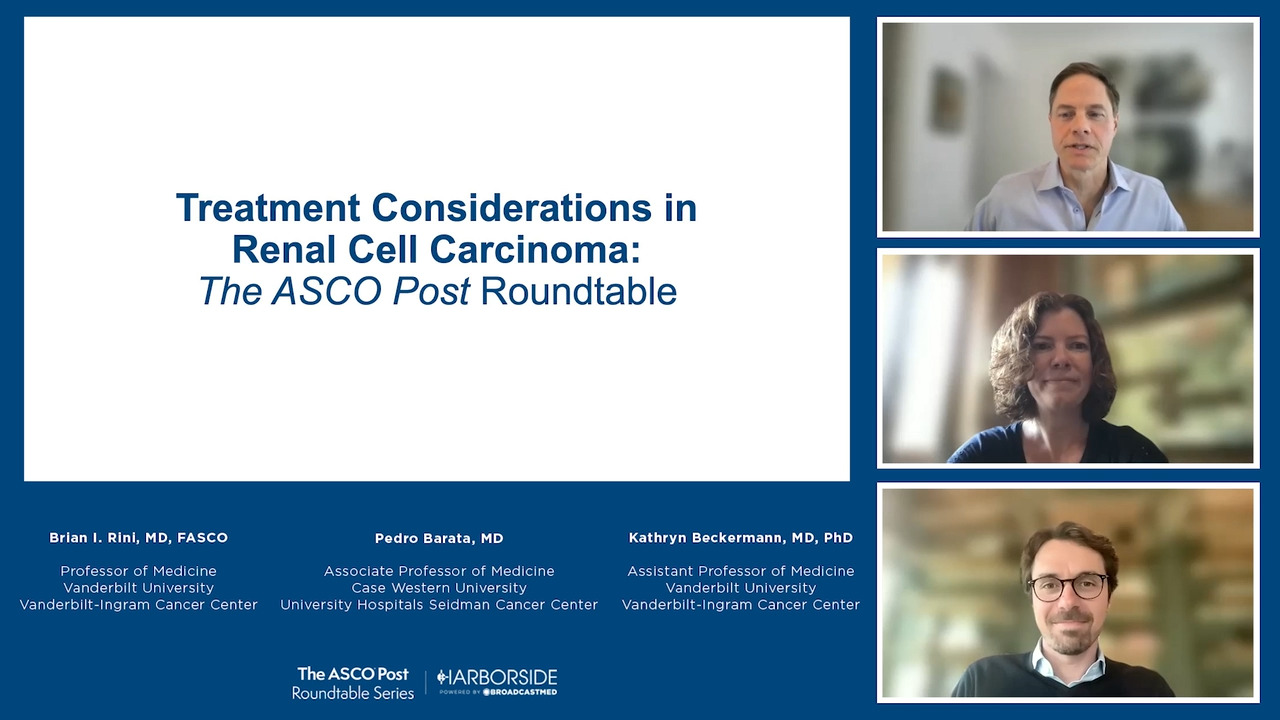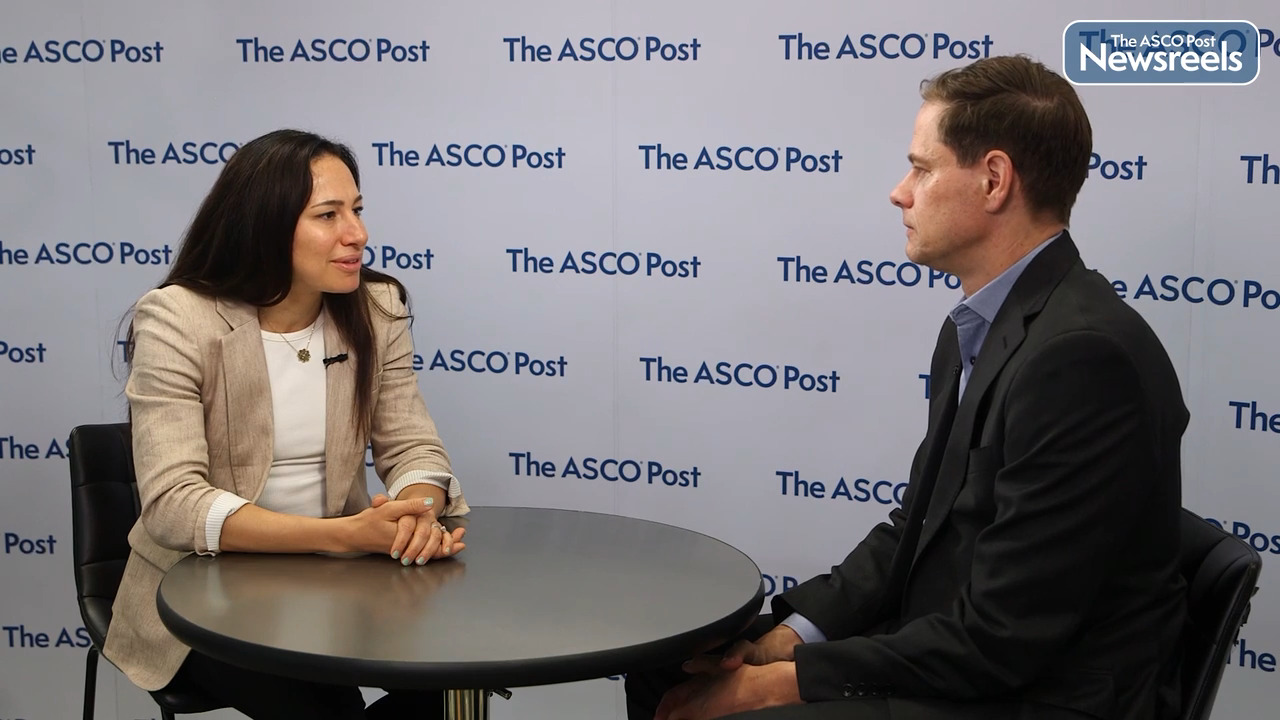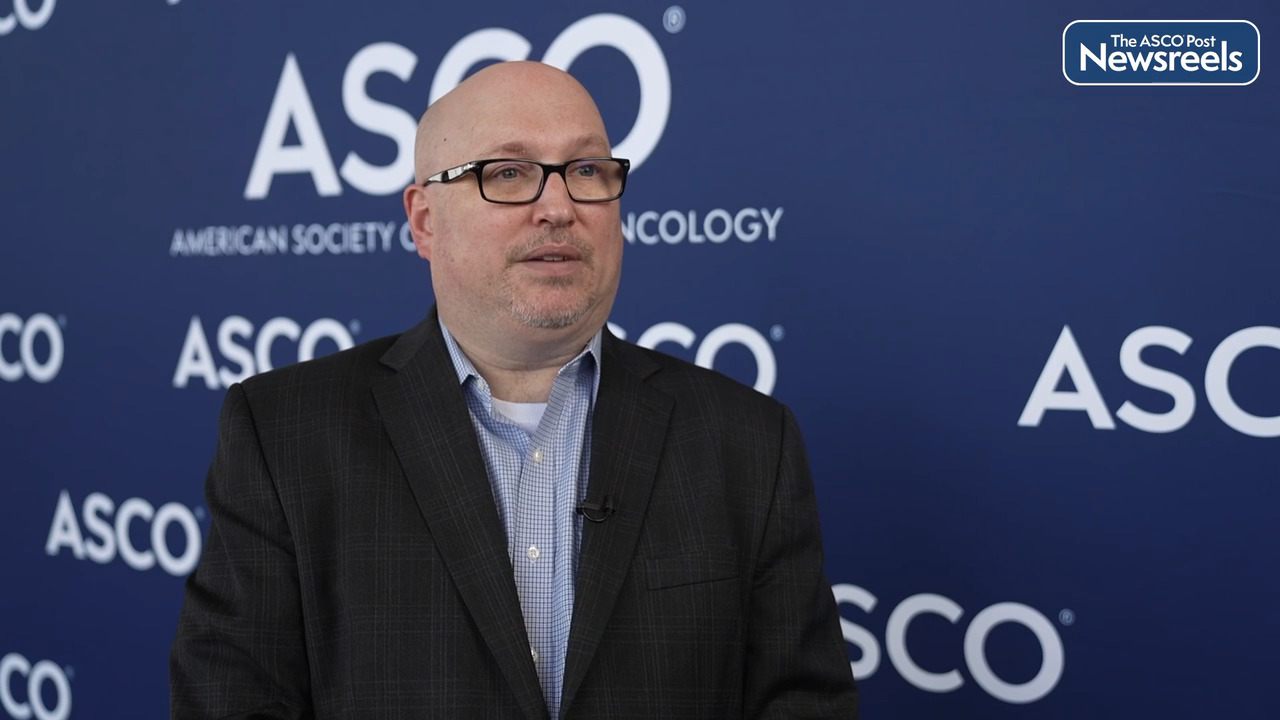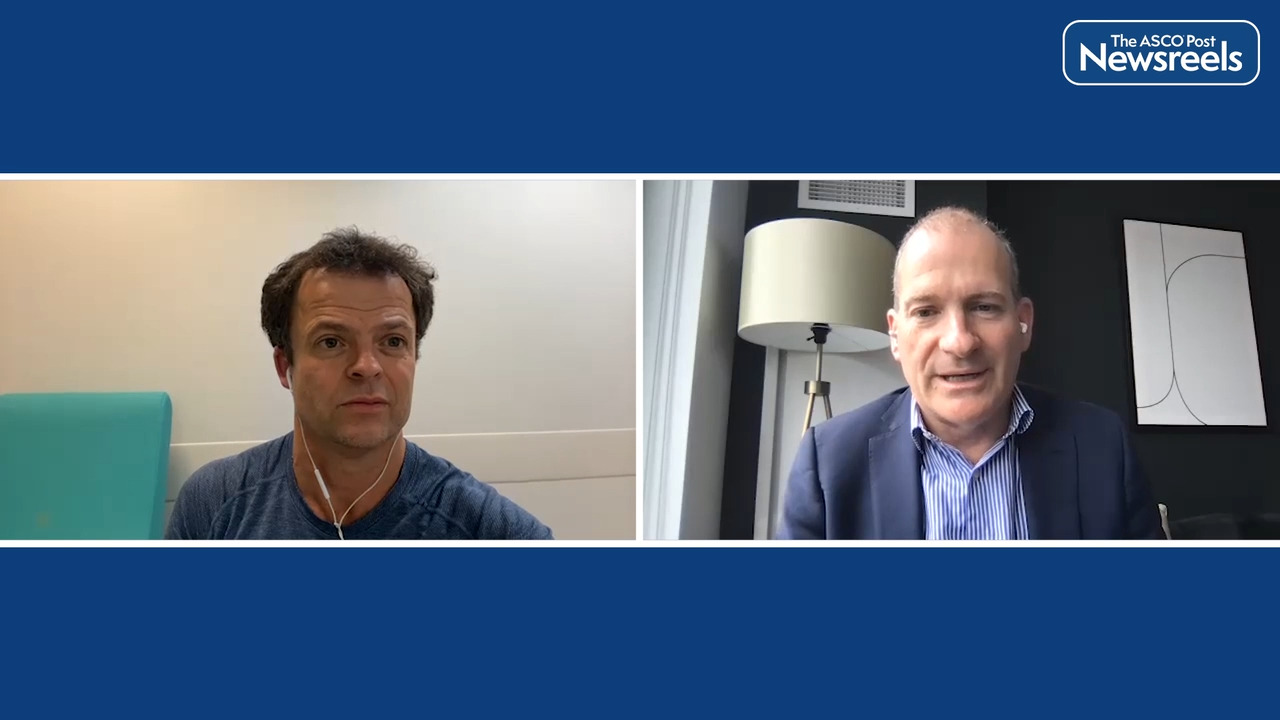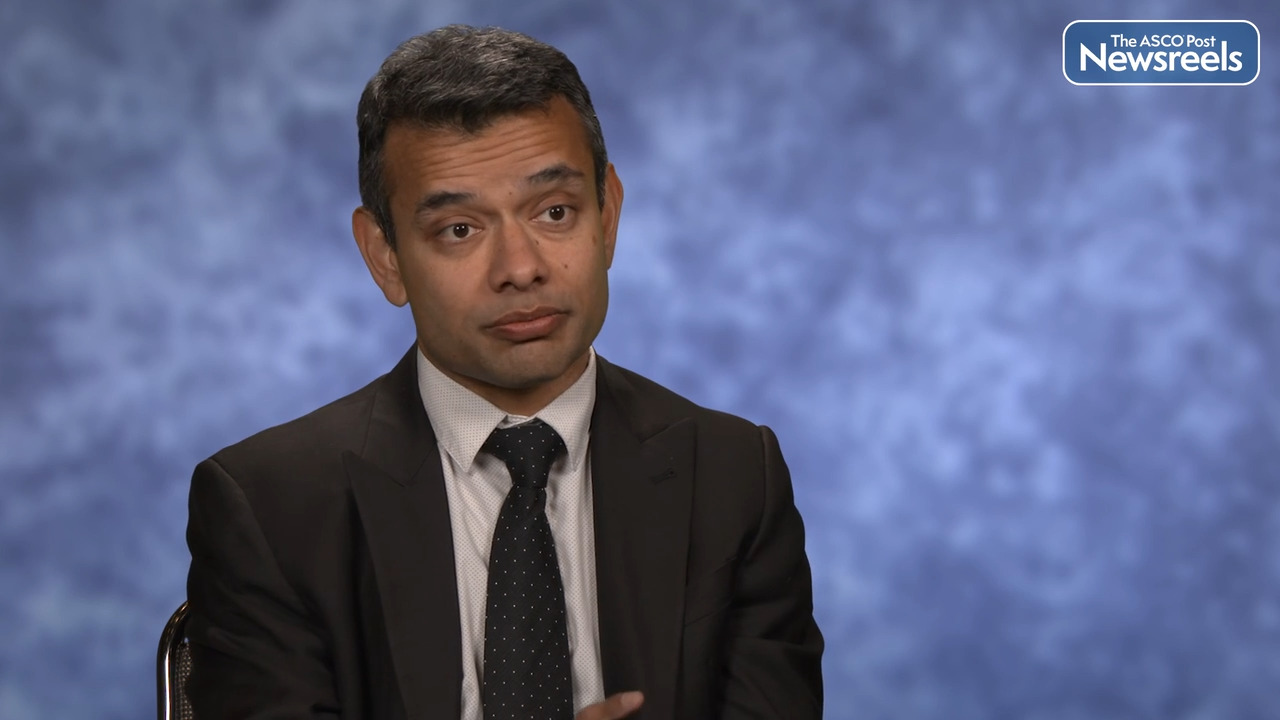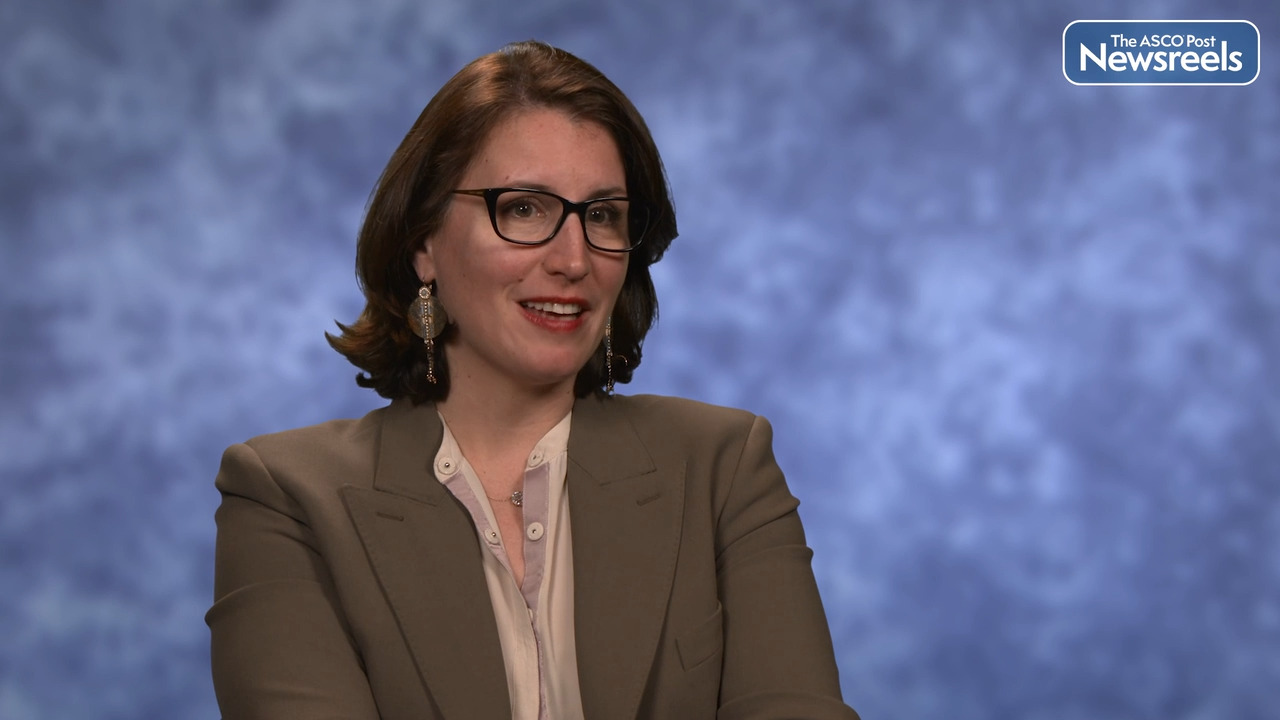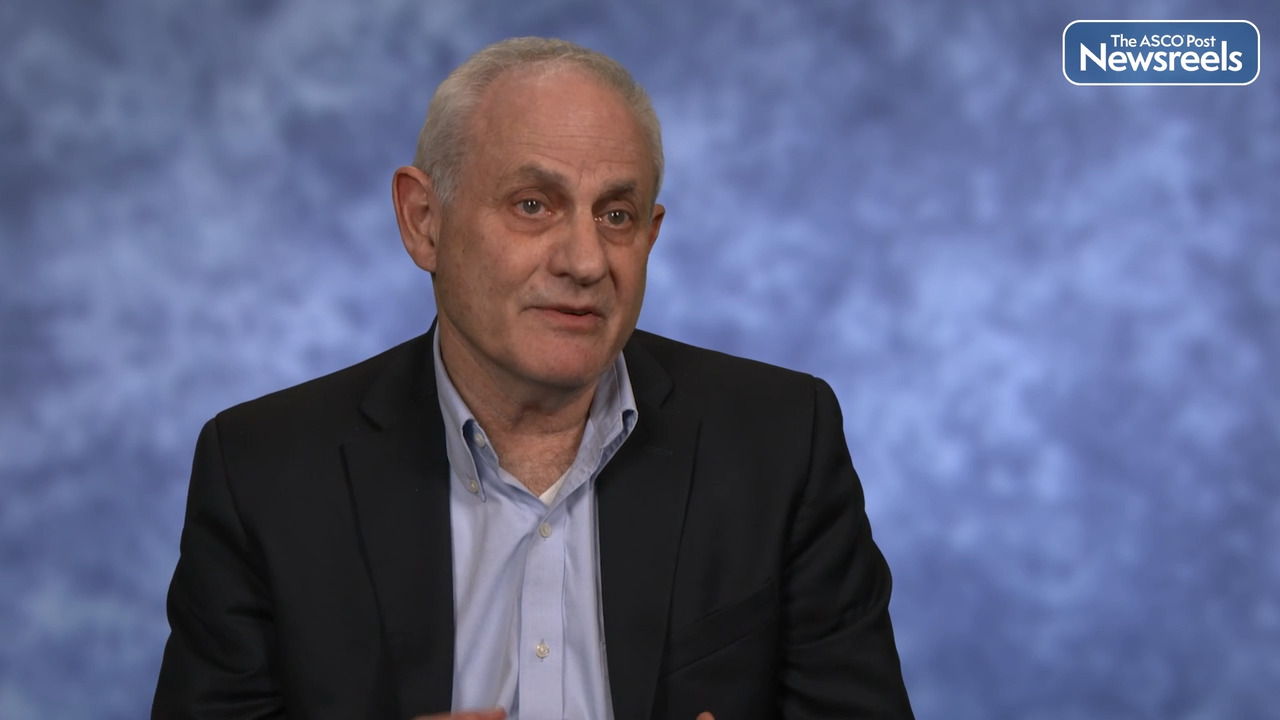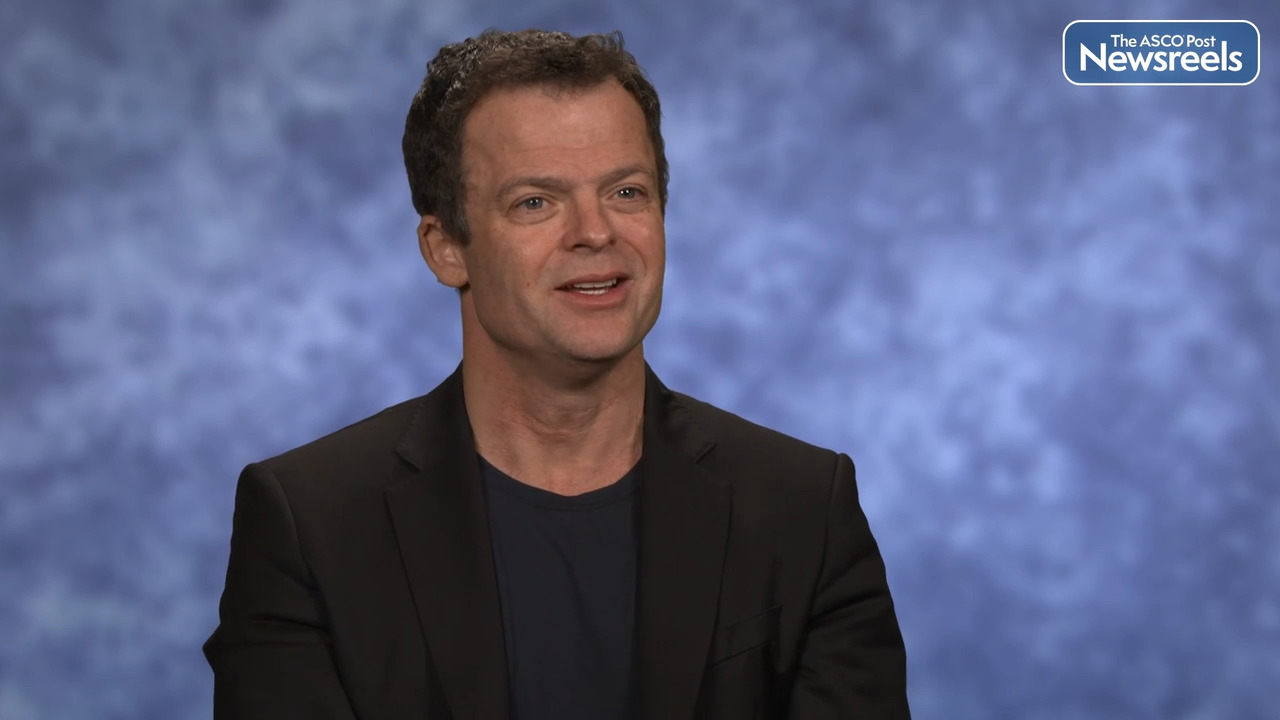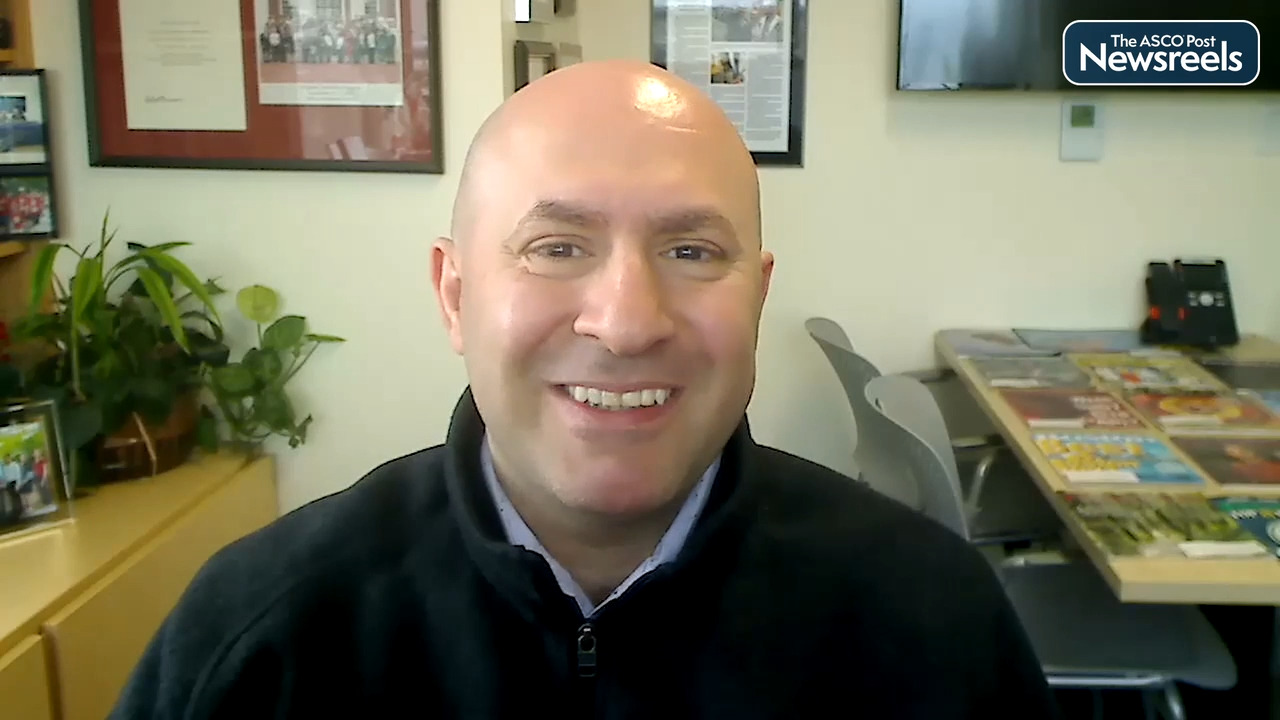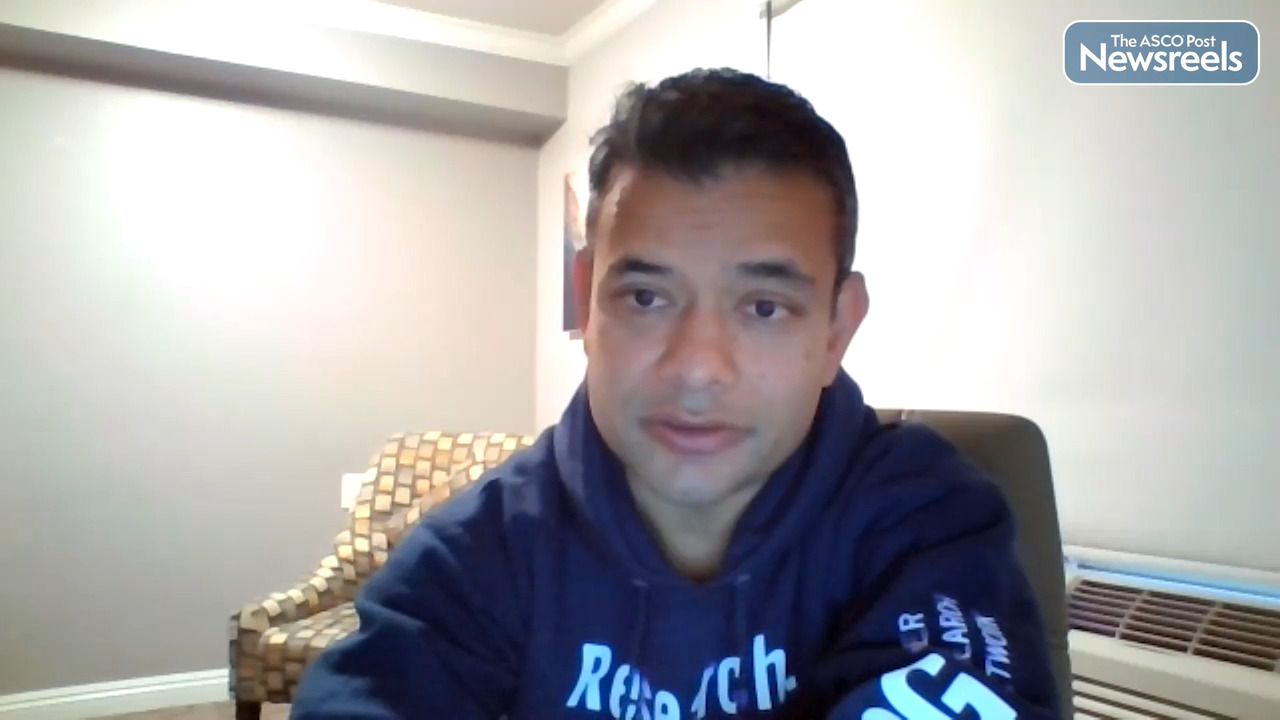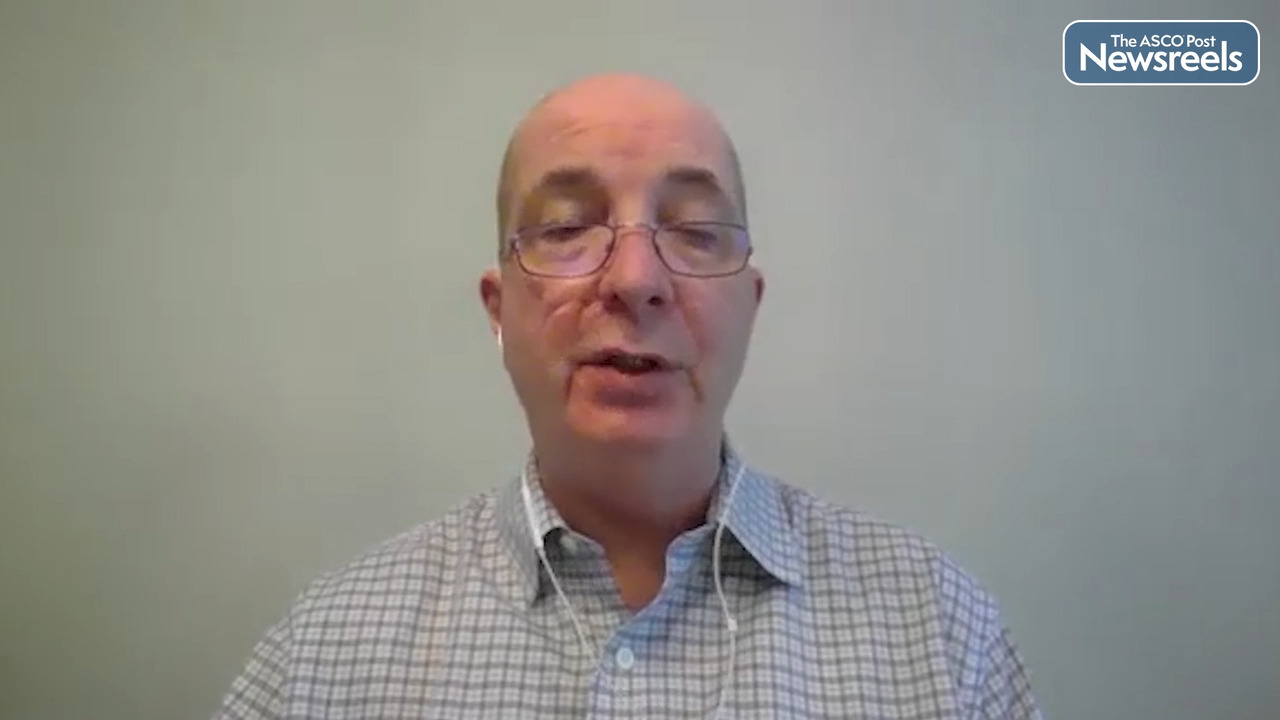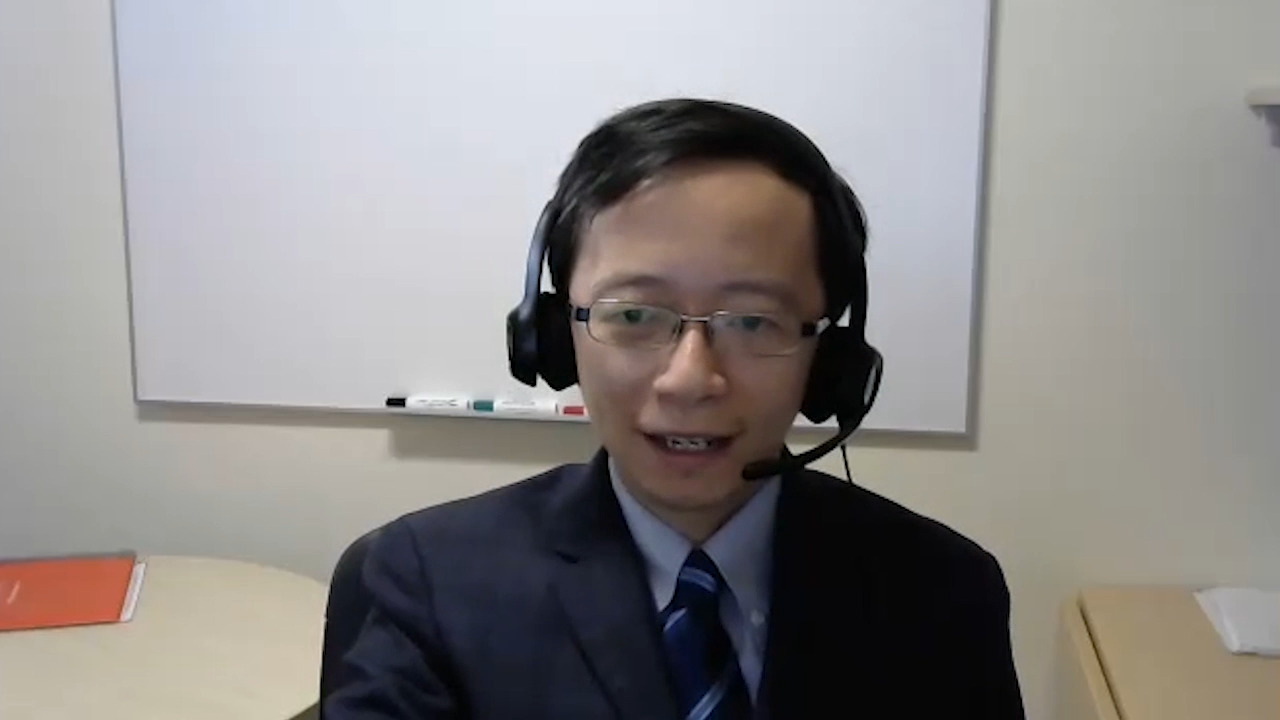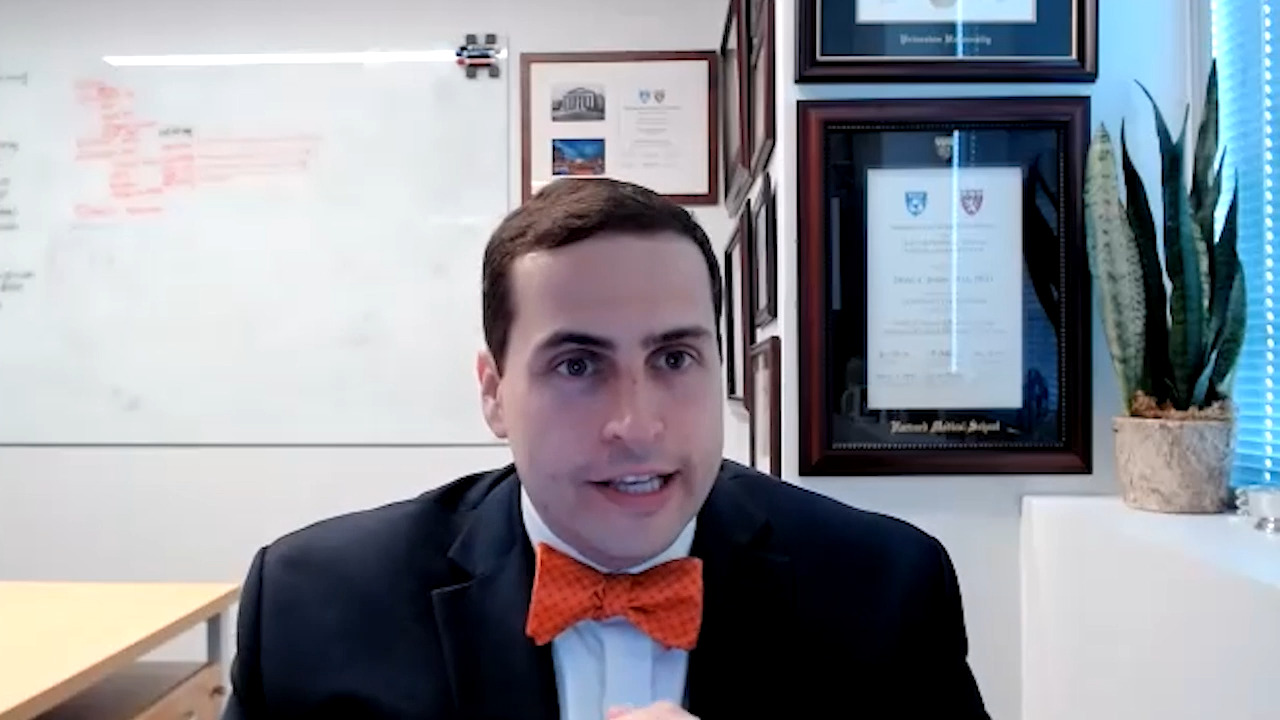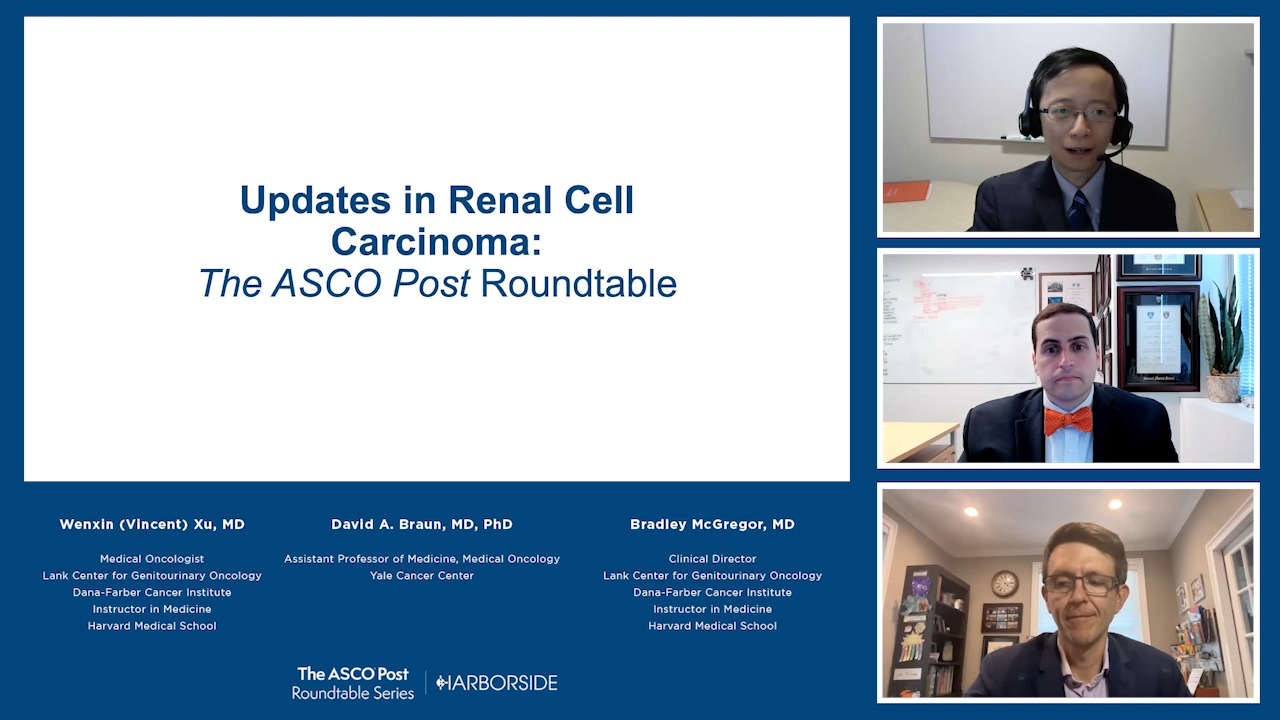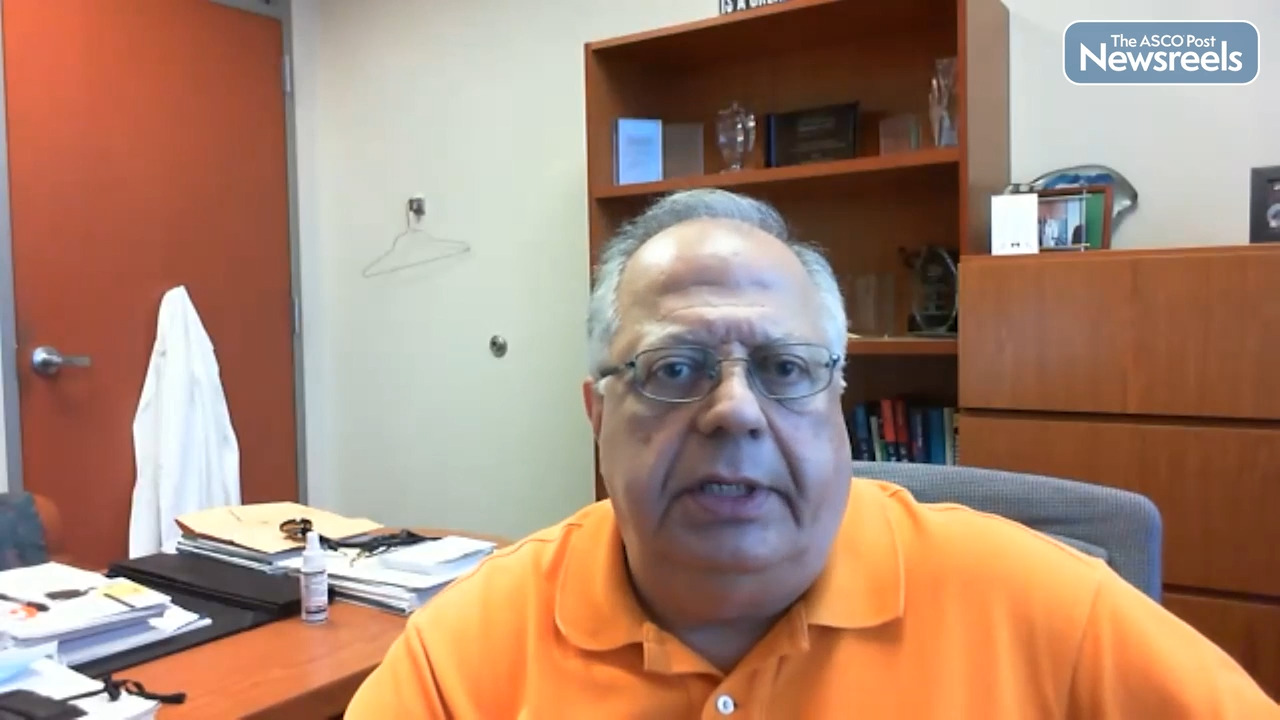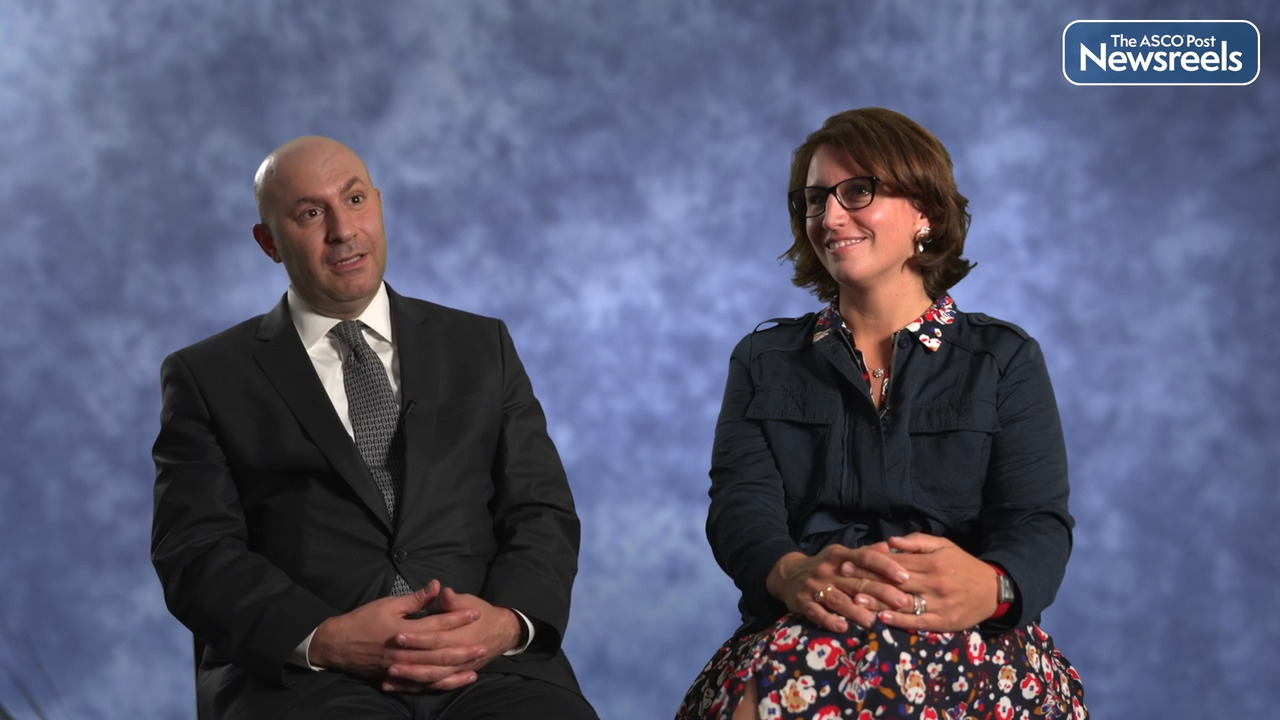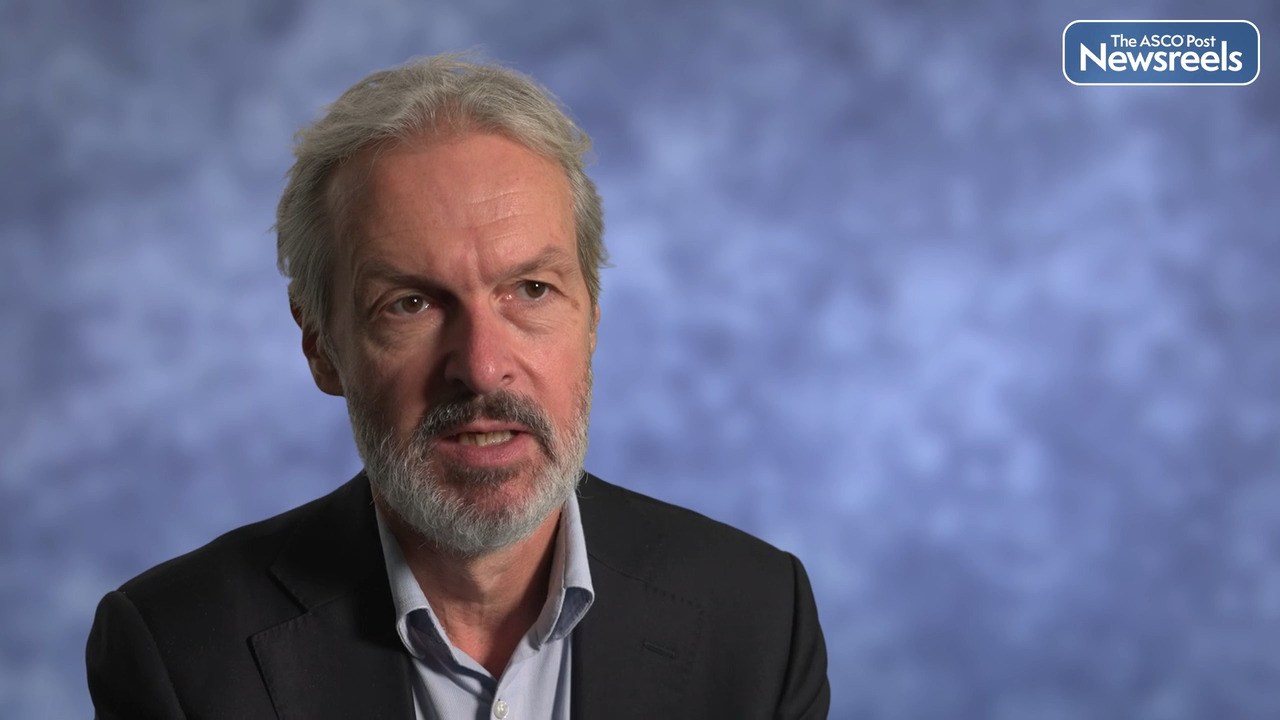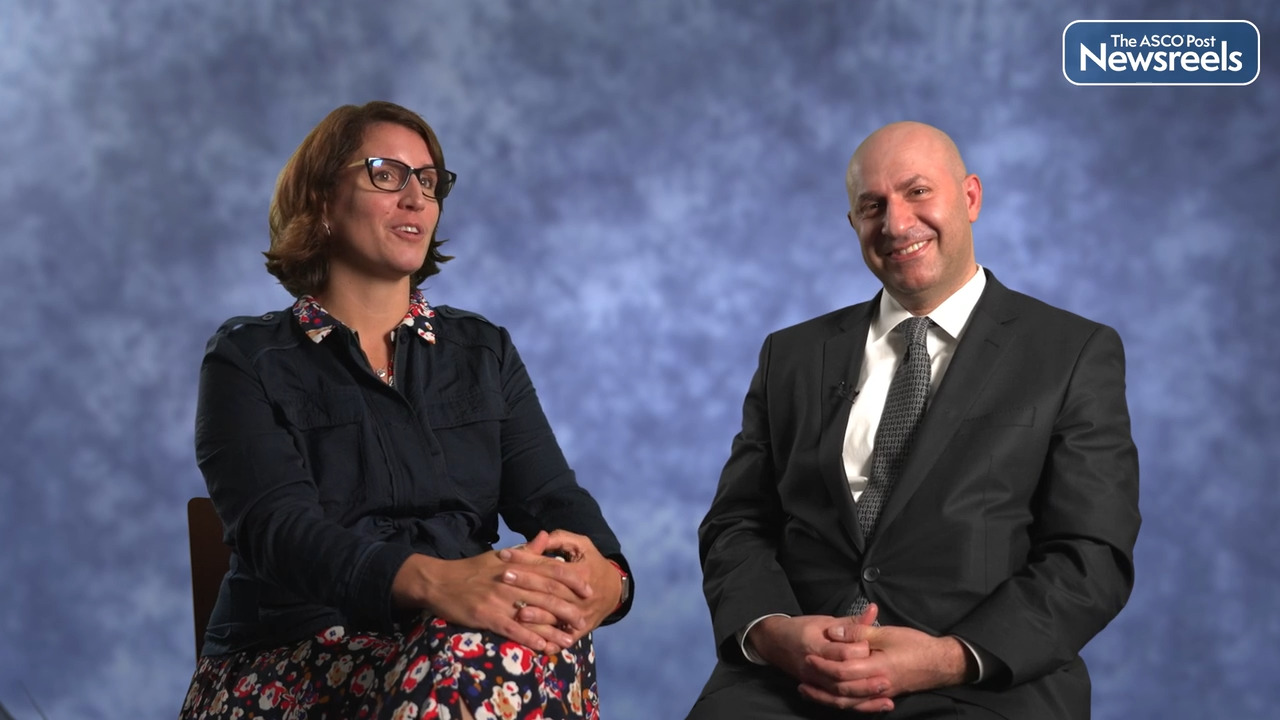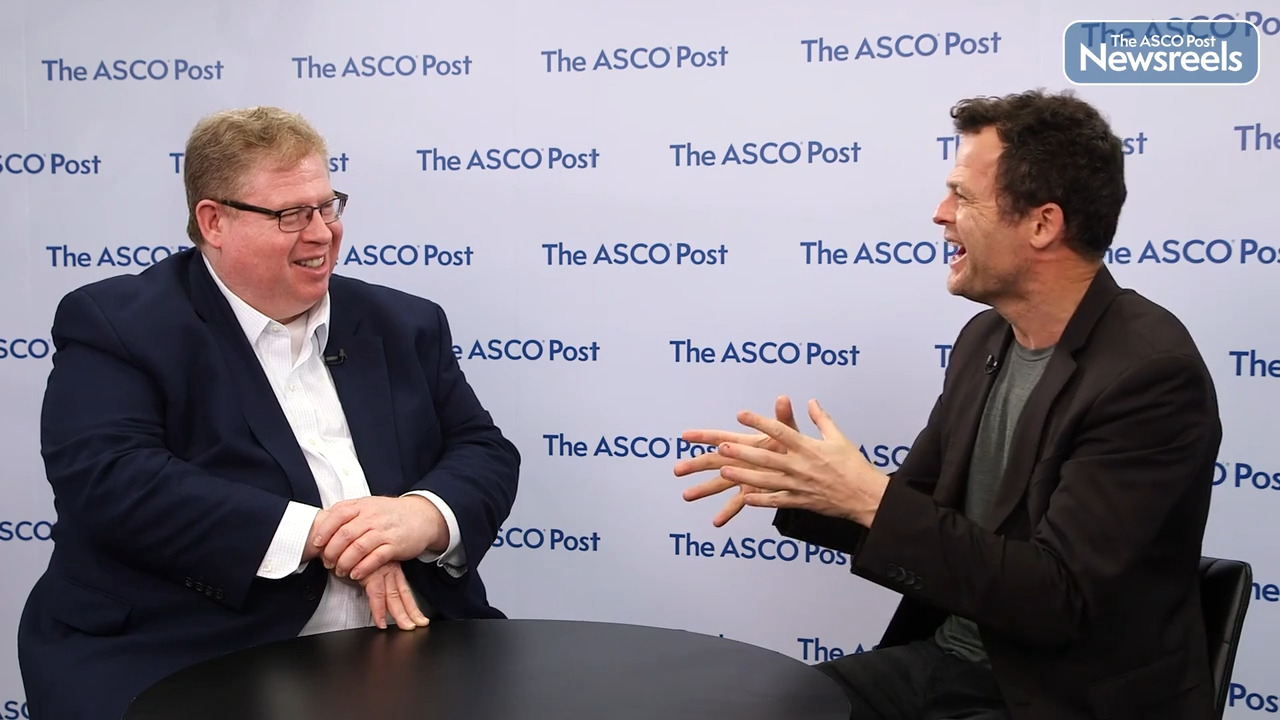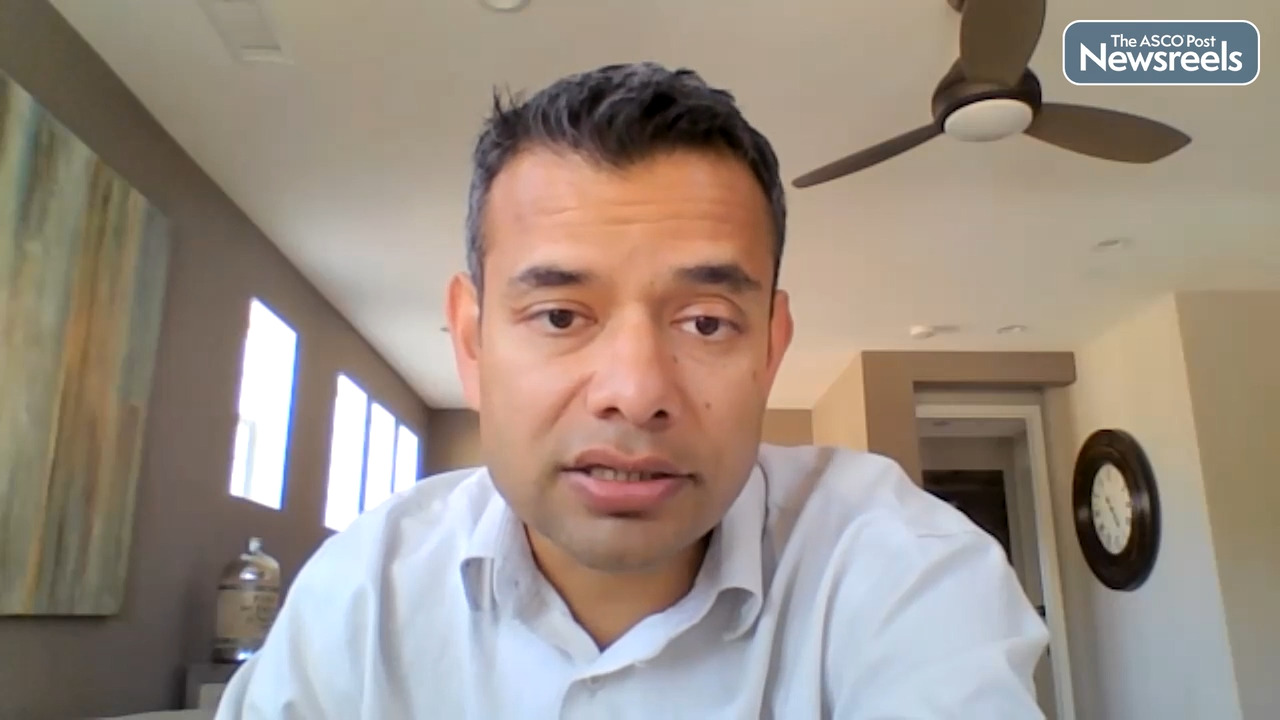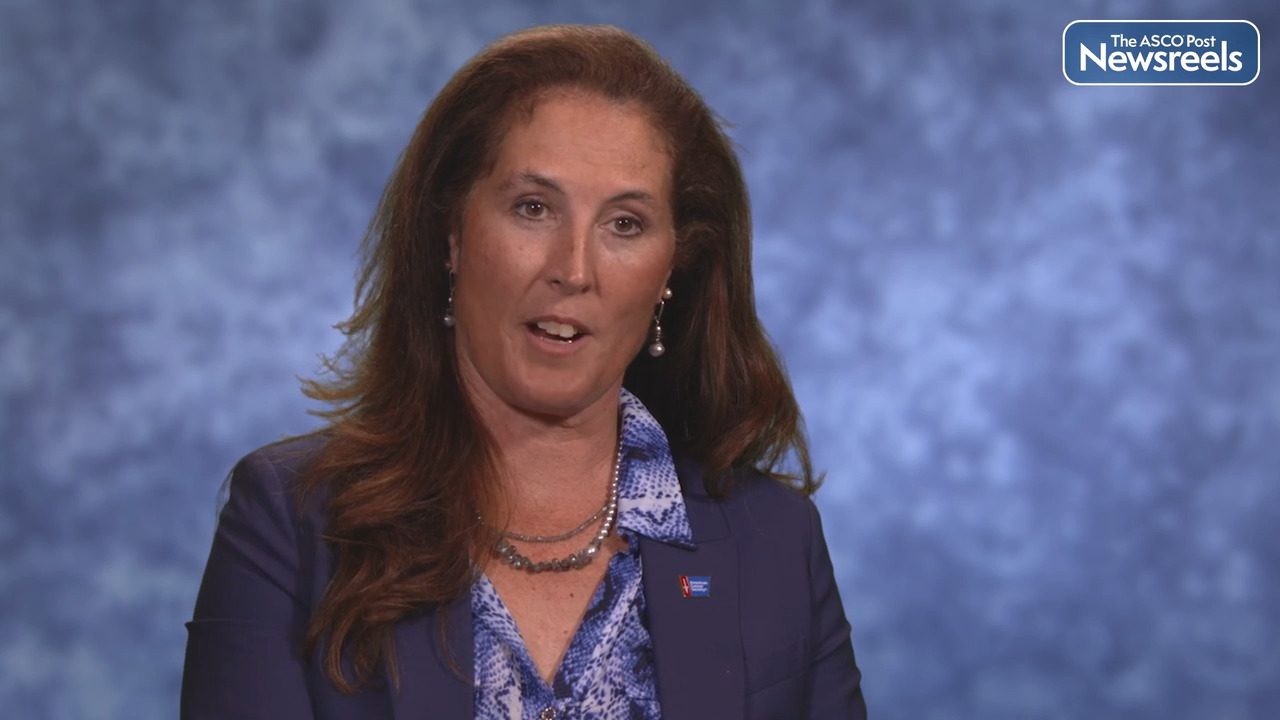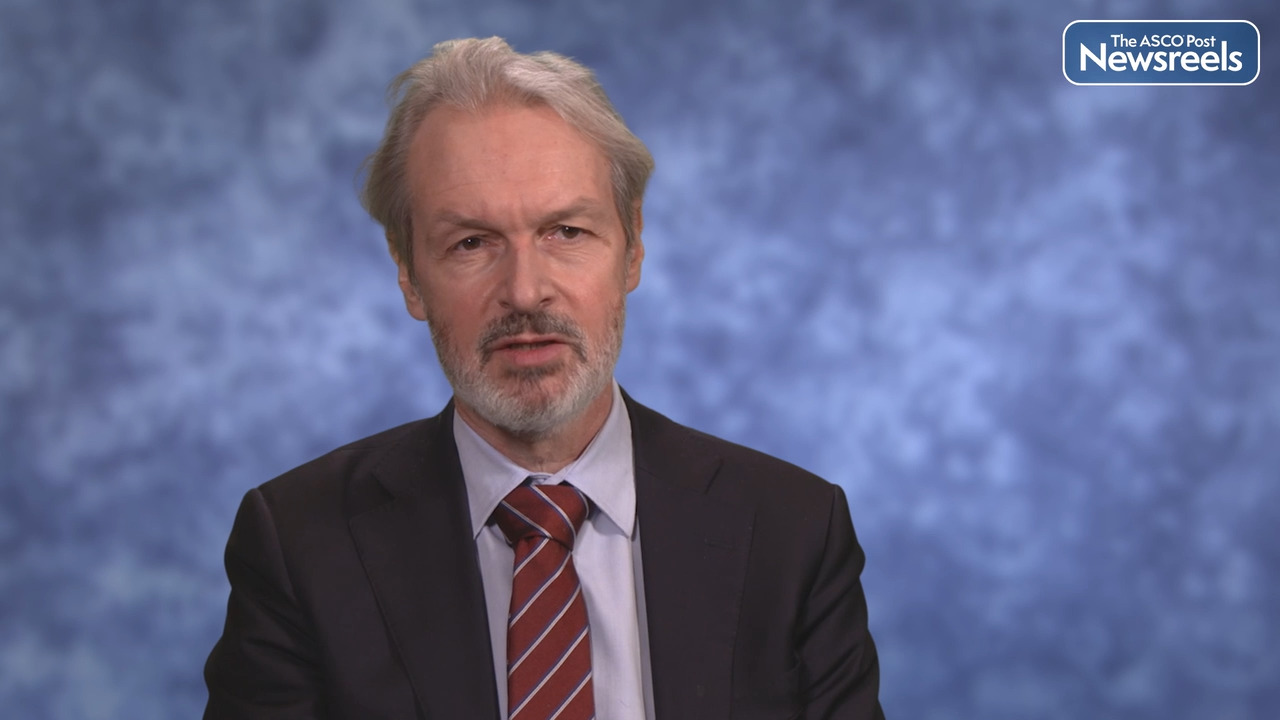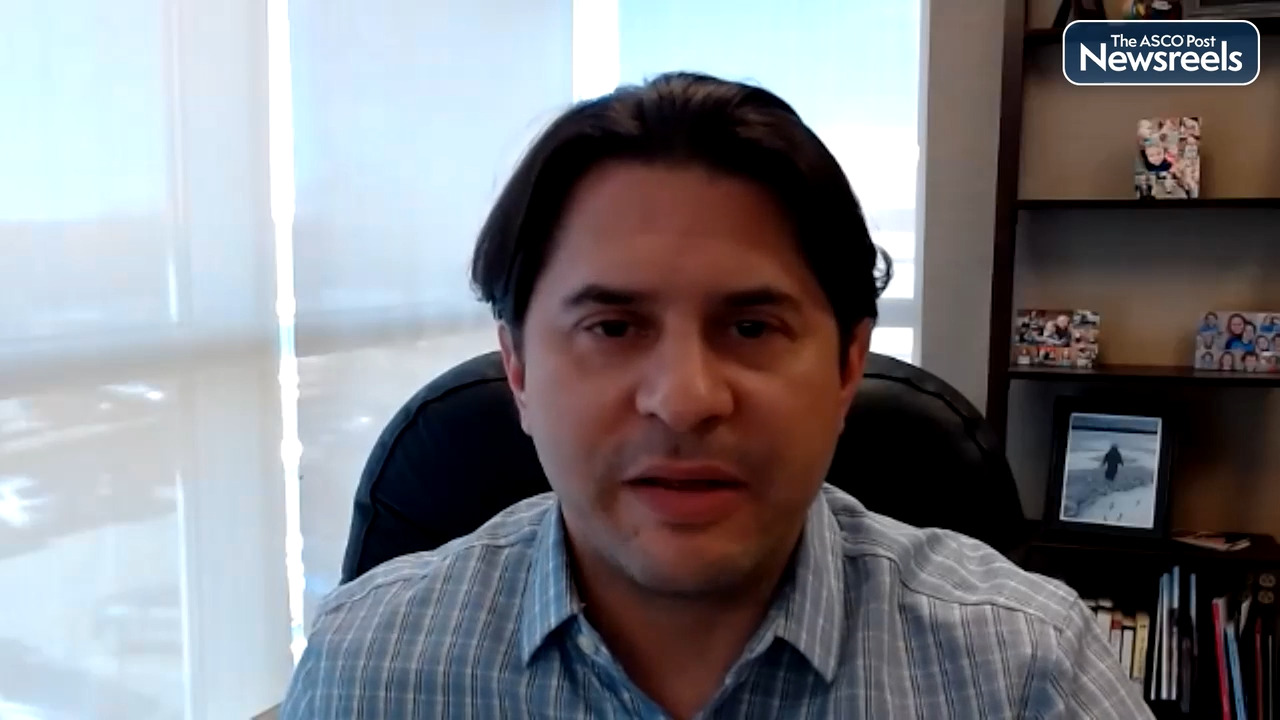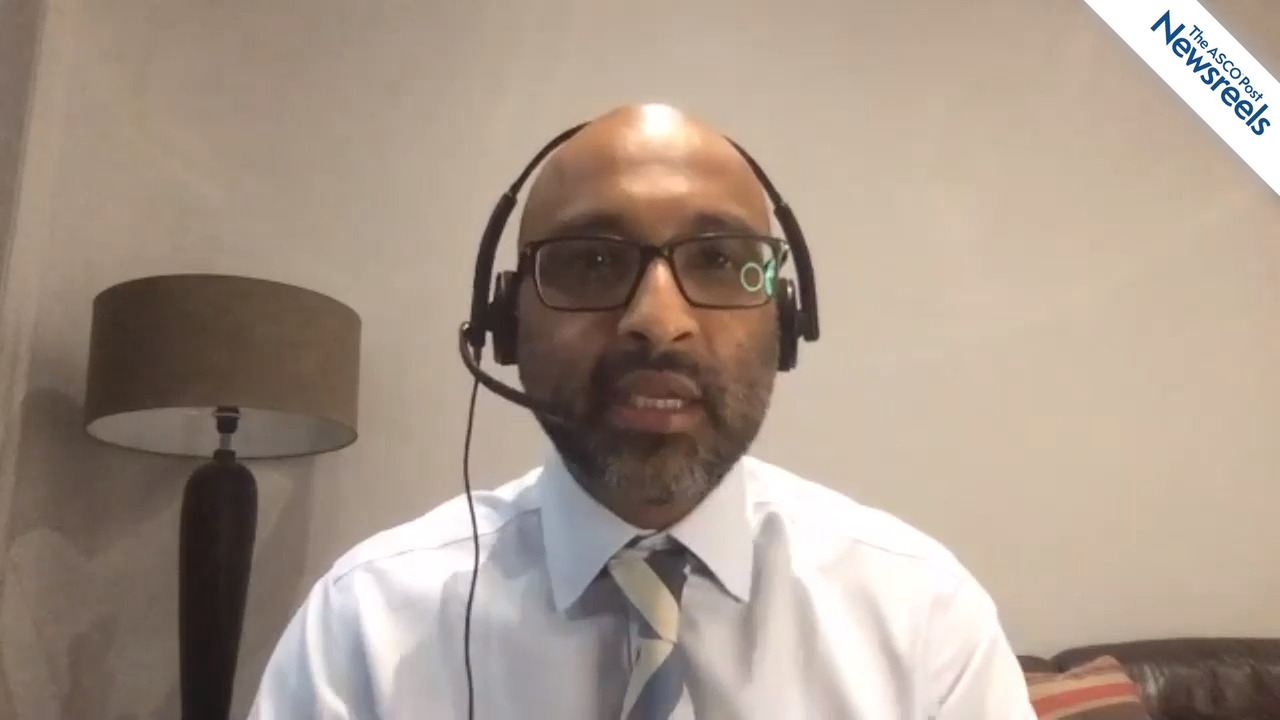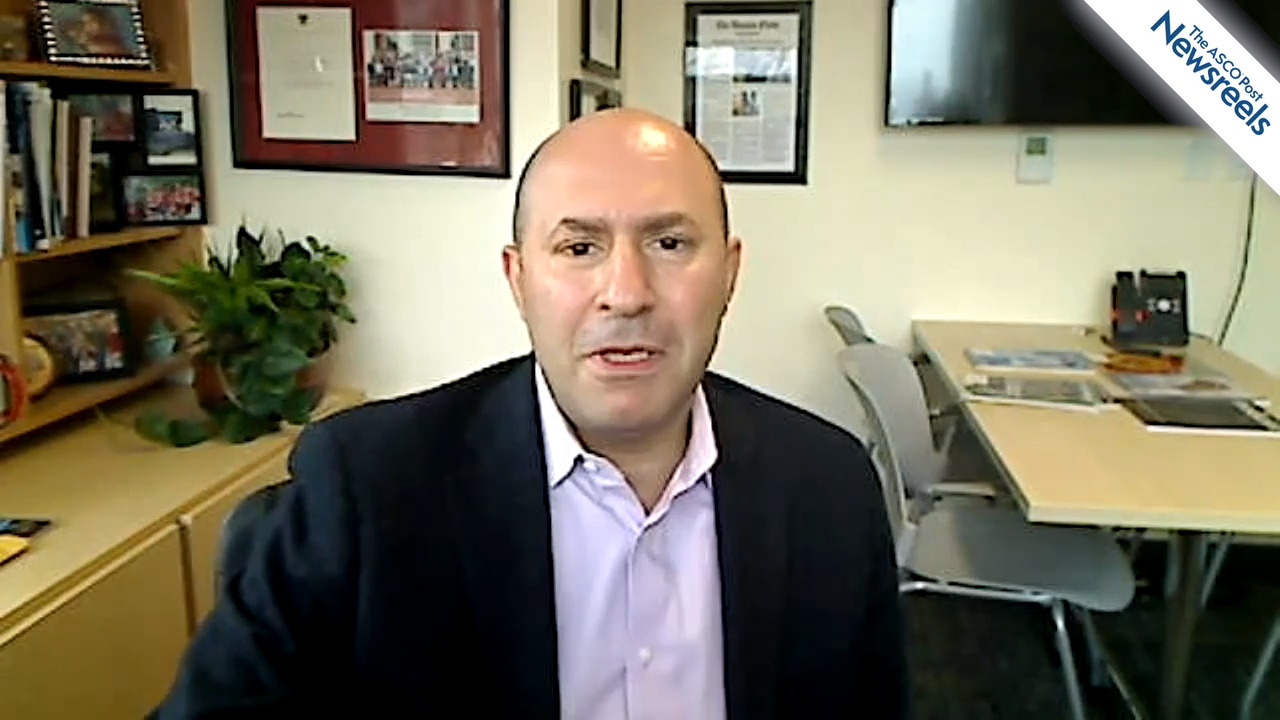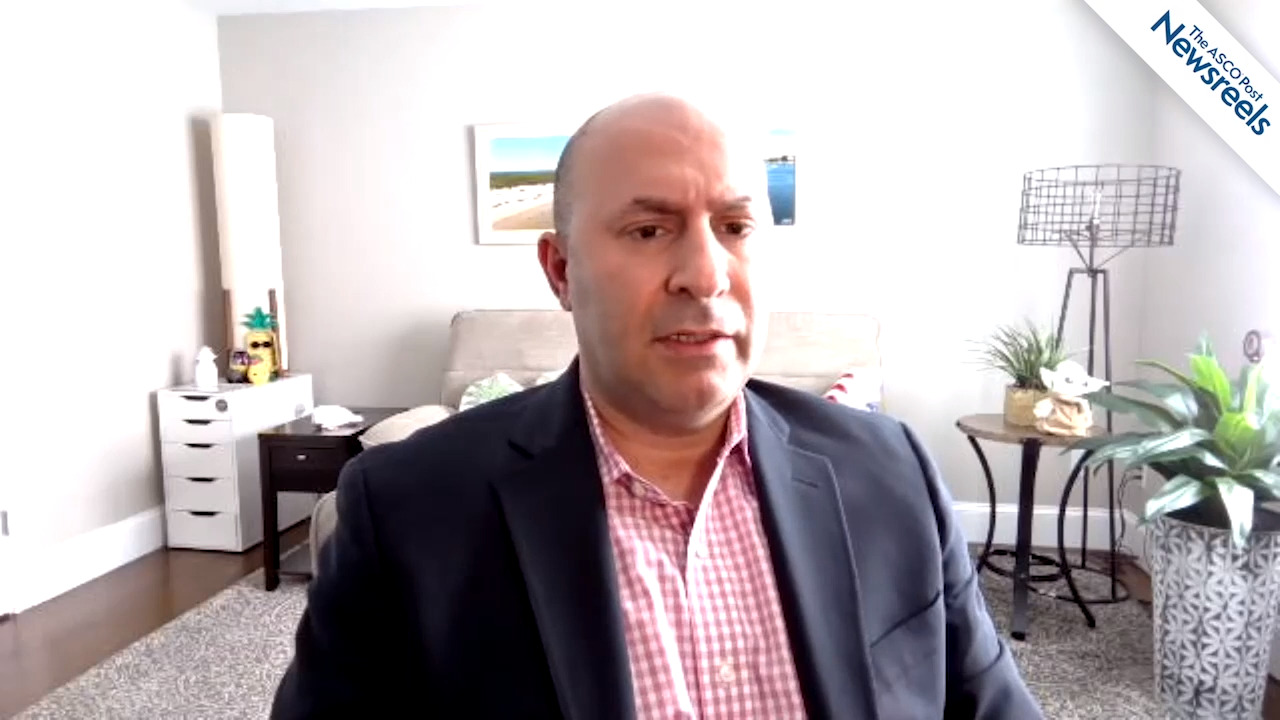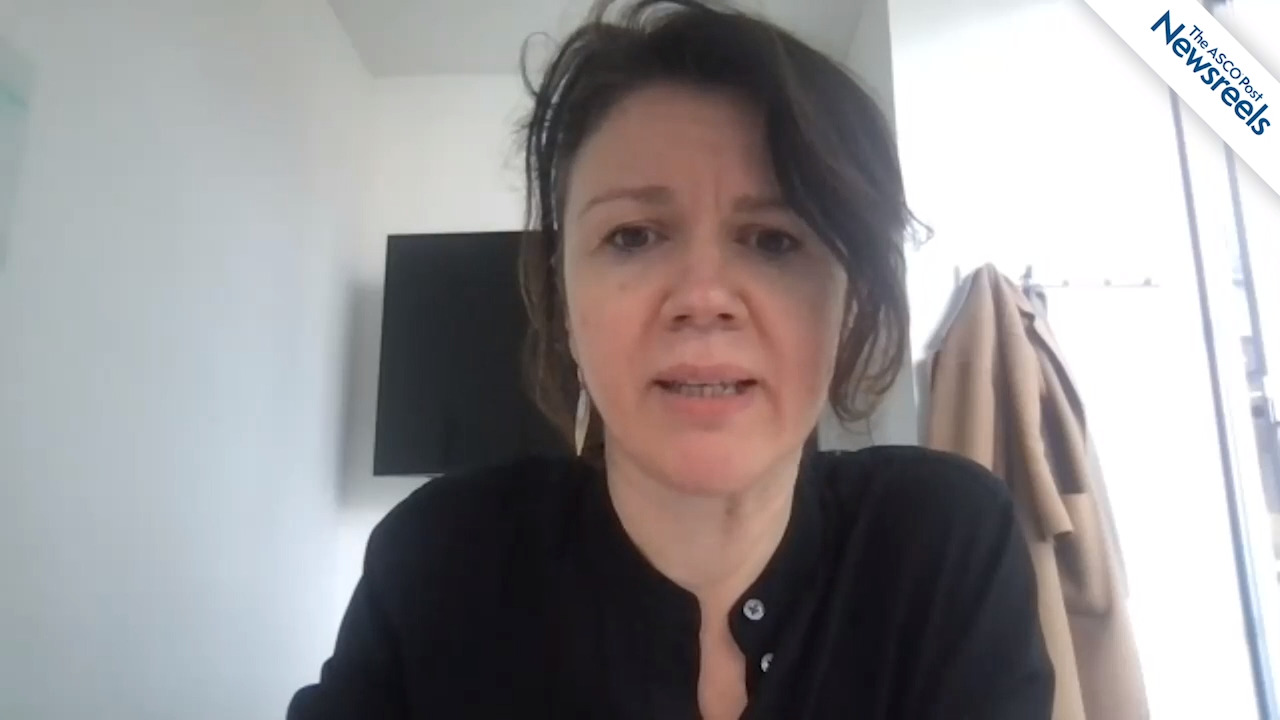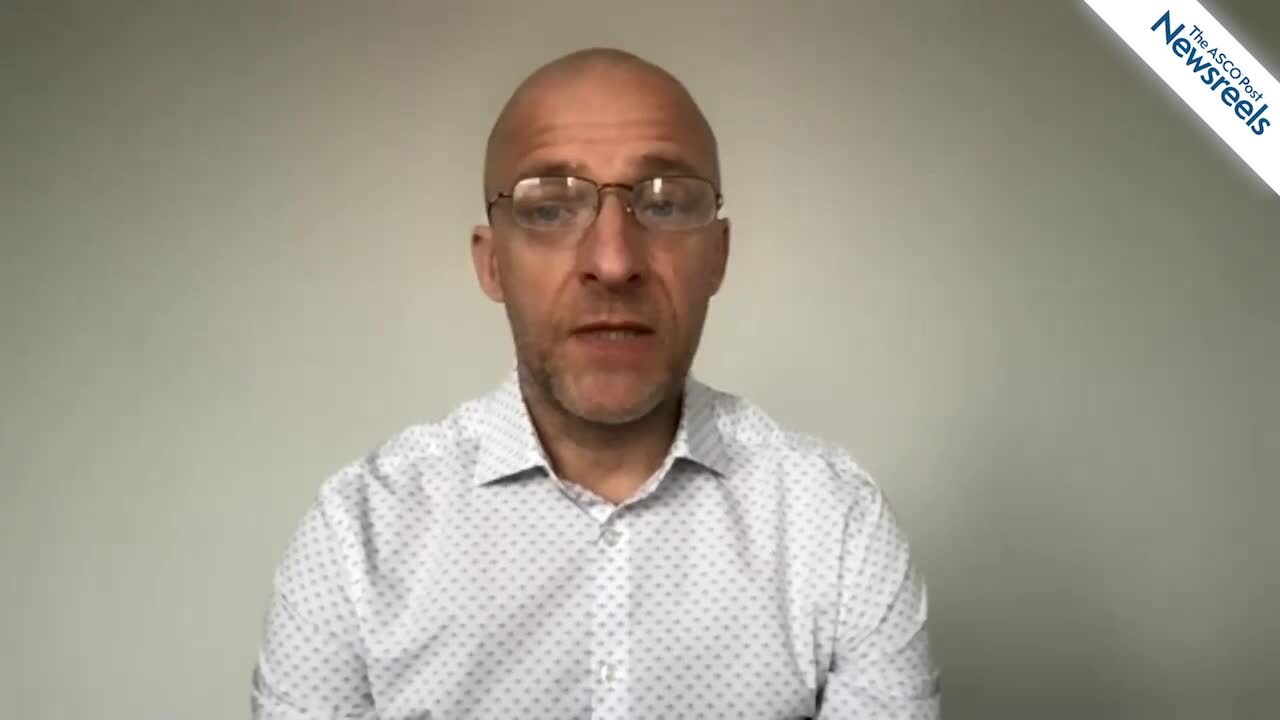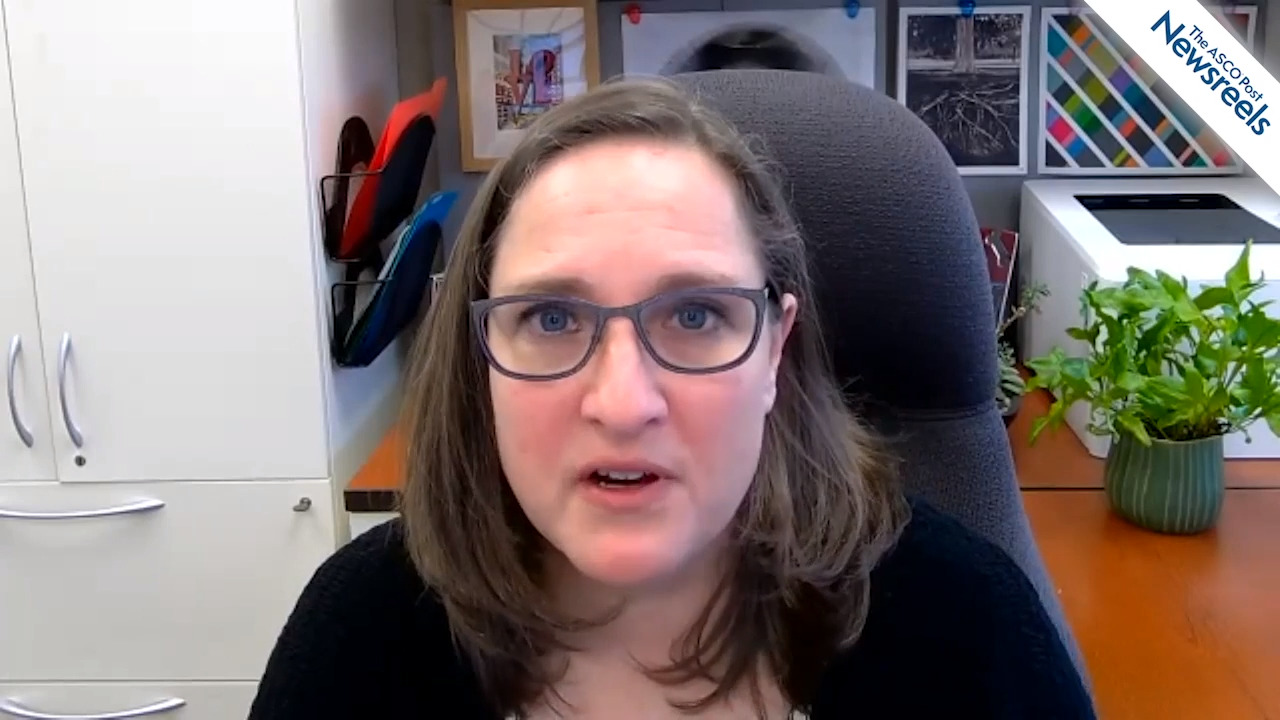Case 3: Patient With Recurrent Chromophobe RCC
This is Part 3 of New Approaches to Treatment Sequencing in Advanced Renal Cell Carcinoma, a three-part video roundtable series. Scroll down to watch the other videos from this roundtable. In this video, Drs. Daniel George, Michael Harrison, and Catherine Fahey discuss the treatment of recurrent chromophobe renal cell carcinoma (RCC). The patient is a 67-year-old man who presented with flank pain in 2017 and is found to have a right renal mass on CT. Pathology following nephrectomy reveals a 19-cm chromophobe pathologic stage IIIa RCC, grade 2, with no involved nodes or metastases. He is followed until 2020, when CT reveals an 8.8-cm retroperitoneal mass, which CT-guided biopsy confirms to be a recurrence of his chromophobe RCC. The next month, an exploratory laparotomy reveals multiple liver metastases. In the conversation that follows, the faculty discuss possible treatment options for this patient with non–clear cell RCC, how to approach oligoprogressive disease, and whether immunotherapy may play a role in the treatment of chromophobe RCC.
Case 2: Patient With Recurrent Clear Cell RCC
This is Part 2 of New Approaches to Treatment Sequencing in Advanced Renal Cell Carcinoma, a three-part video roundtable series. Scroll down to watch the other videos from this roundtable. In this video, Drs. Daniel George, Michael Harrison, and Catherine Fahey discuss the treatment of recurrent renal cell carcinoma (RCC). The patient is a 51-year-old man who was originally diagnosed in 2013 with stage III clear cell RCC, grade 2. He underwent nephrectomy and was disease-free for 5 years until 2018, when a CT scan showed a 1.1-cm right adrenal nodule and multiple enlarging lung nodules. Video-assisted thoracic surgery revealed clear cell RCC. In the conversation that follows, the faculty discuss the treatment course for this patient as his disease continues to slowly progress, when to offer tumor-directed therapy vs systemic therapy, later-line treatment options, and the importance of prioritizing patient quality of life.
Case 1: Patient With Poor-Risk Metastatic RCC
This is Part 1 of New Approaches to Treatment Sequencing in Advanced Renal Cell Carcinoma, a three-part video roundtable series. Scroll down to watch the other videos from this roundtable. In this video, Drs. Daniel George, Michael Harrison, and Catherine Fahey discuss the treatment of a patient with metastatic renal cell carcinoma (RCC) and multiple adverse risk factors. The patient is a 67-year-old woman who presented to her primary care provider (PCP) with 20-pound weight loss, anemia, low appetite, and new-onset hypertension. In addition to anemia, she is found to have leukocytosis, neutrophilia, thrombocytosis, and hypercalcemia. One month later, she presents to her PCP with severe headache and is noted to have hepatomegaly. A CT scan of the abdomen and pelvis reveals a right renal mass with possible invasion of the liver. In the conversation that follows, the faculty discuss the impact of this patient’s risk factors on her choice of treatment, whether immunotherapy could be considered, the importance of goals-of-care conversations, and more.
Laurence Albiges, MD, PhD, on Renal Cell Carcinoma: Biomarker Analysis of the IMmotion010 Study
Laurence Albiges, MD, PhD, of Gustave Roussy, Université Paris-Saclay, discusses phase III findings showing that high baseline serum KIM-1 levels were associated with poorer prognosis but improved clinical outcomes with atezolizumab vs placebo in patients with renal cell carcinoma at increased risk of recurrence after resection. Increased post-treatment KIM-1 levels were found to be associated with worse disease-free survival (Abstract 4506).
Brian I. Rini, MD, on Renal Cell Carcinoma: Exploratory Biomarker Results
Brian I. Rini, MD, of Vanderbilt Ingram Cancer Center, discusses phase III findings of the KEYNOTE-426 study of pembrolizumab plus axitinib vs sunitinib for patients with advanced renal cell carcinoma. He details the exploratory biomarker results, including RNA sequencing, whole-exome sequencing, and PD-L1 (Abstract 4505).
Toni K. Choueiri, MD, FASCO, on RCC: Biomarker Analysis From the CLEAR Trial
Toni K. Choueiri, MD, FASCO, of the Dana-Farber Cancer Institute, discusses phase III findings showing that, in patients with advanced renal cell carcinoma (RCC), the benefit of lenvatinib plus pembrolizumab vs sunitinib in overall response rate does not appear to be affected by such factors as gene‐expression signatures for tumor‐induced proliferation, PD‐L1 status, or the mutation status of RCC driver genes.
Metastatic RCC After Disease Progression on VEGF/IO Therapy
This is Part 3 of Later-Line Considerations in Relapsed/Refractory Renal Cell Carcinoma, a three-part video roundtable series. Scroll down to watch the other videos from this roundtable. In this video, Drs. Rana McKay, Bradley McGregor, and Sumanta K. Pal discuss the management of metastatic renal cell carcinoma (RCC) after disease progression on VEGF-targeted therapy and immunotherapy (IO). The patient is a 56-year-old woman who presented in 2015 with sharp abdominal pain. Imaging revealed a large renal mass, and CT of the chest and brain MRI were negative. She underwent a left nephrectomy, which revealed a 10.9-cm grade 3 renal cell carcinoma with renal vein invasion. After 4 years of surveillance, a CT of the chest, abdomen, and pelvis revealed pulmonary nodules and a right adrenal nodule. She started treatment with nivolumab plus ipilimumab, continuing to receive maintenance nivolumab after completion of therapy. One year later, she developed a retinal detachment related to immune infiltrates, which led to the permanent discontinuation of nivolumab. She continued to be monitored, and her disease was found to be stable with the exception of growing right adrenal nodule, for which she received stereotactic ablative body radiotherapy. The following year, she experienced disease progression in her lungs with multiple new pulmonary nodules. In the conversation that follows, the faculty discuss how to approach the management of a patient presenting with newly diagnosed metastatic RCC, the role of radiation therapy for patients with oligoprogressive disease, and treatment options in the later-line setting for patients whose disease progresses on VEGF-targeted therapy and IO.
Refractory RCC After Disease Progression on Adjuvant IO Therapy
This is Part 2 of Later-Line Considerations in Relapsed/Refractory Renal Cell Carcinoma, a three-part video roundtable series. Scroll down to watch the other videos from this roundtable. In this video, Drs. Rana McKay, Bradley McGregor, and Sumanta K. Pal discuss the management of refractory renal cell carcinoma (RCC) after disease progression on adjuvant immunotherapy (IO). The patient is a 50-year-old man who underwent an early cancer detection test in 2022 and received a positive test result. A CT of the chest, abdomen, and pelvis revealed a 5.1-cm right upper pole mass in the kidney. He underwent a right partial nephrectomy and was found to have grade 3 clear cell RCC with perinephric fat invasion and renal vein invasion. The patient received pembrolizumab for 1 year, followed by a 3-month surveillance schedule. On his first subsequent scan, he was found to have new small pulmonary nodules and underwent a video-assisted thoracoscopic surgery, which confirmed clear cell RCC. In the conversation that follows, the faculty discuss their preferred methods of risk stratification, how to address small changes revealed on surveillance scans after IO therapy, and whether IO or VEGF-targeted therapy would be appropriate following disease progression on adjuvant IO.
Metastatic Favorable-Risk RCC After Progression on VEGF/IO Therapy
This is Part 1 of Later-Line Considerations in Relapsed/Refractory Renal Cell Carcinoma, a three-part video roundtable series. Scroll down to watch the other videos from this roundtable. In this video, Drs. Rana McKay, Bradley McGregor, and Sumanta K. Pal discuss the management of metastatic favorable-risk renal cell carcinoma (RCC) in a patient whose disease has progressed after receiving treatment with VEGF inhibitors and immunotherapy (IO). The patient is a 67-year-old woman who was diagnosed with localized clear cell RCC in 2007 and monitored with active surveillance. Almost 10 years after her original diagnosis, she developed progressive disease with a stable pulmonary nodule, a small but growing adrenal nodule, and a new pancreatic mass. Over the next 2 years, she received pazopanib, which was discontinued due to intolerance, and nivolumab, which was discontinued after growth of her adrenal nodules and pancreatic metastasis. In the conversation that follows, the faculty discuss when active surveillance may be appropriate for patients with renal cell carcinoma, how to approach patients who present with metastatic disease after a long latency period, the impact that sites of metastasis have on treatment options, and what options are available after disease progression on multiple lines of therapy.
Thomas Powles, MD, on Clear Cell Kidney Cancer: Overall Survival Update With Adjuvant Pembrolizumab
Thomas Powles, MD, of Barts Cancer Institute, Cancer Research UK Experimental Cancer Medicine Centre, and Queen Mary University of London, discusses overall survival results from the phase III KEYNOTE-564 study of adjuvant pembrolizumab vs placebo in patients with clear cell renal cell carcinoma (Abstract LBA359).
Andrew Johns, MD, on Clear Cell Renal Cell Carcinoma: Data on Tivozanib in Pretreated Patients
Andrew Johns, MD, of The University of Texas MD Anderson Cancer Center, discusses efficacy, safety, and tolerability data on tivozanib. The agent yielded a modest clinical benefit in a minority of patients with advanced clear cell renal cell carcinoma who received prior immune checkpoint–based therapies, cabozantinib, and lenvatinib with or without everolimus (Abstract 419).
Saby George, MD, on Clear Cell Kidney Cancer: Subcutaneous vs Intravenous Nivolumab
Saby George, MD, of Roswell Park Comprehensive Cancer Center, discusses pharmacokinetics, efficacy, and safety results from CheckMate 67T, a phase III trial comparing the use of subcutaneous vs intravenous nivolumab in patients with advanced or metastatic clear cell renal cell carcinoma who have received prior systemic therapy (Abstract LBA360).
Thomas Powles, MD, on RCC: Patient-Reported Outcomes With Belzutifan vs Everolimus
Thomas Powles, MD, of Barts Cancer Institute, Cancer Research UK Experimental Cancer Medicine Centre, and Queen Mary University of London, discusses outcomes reported by patients with previously treated renal cell carcinoma (RCC), taking part in the phase III LITESPARK-005 study. Belzutifan was associated with a prolonged time to deterioration, fewer disease-specific symptoms, and better quality of life compared with everolimus (Abstract 361).
IO-Refractory Advanced Renal Cell Carcinoma
This is Part 3 of Treatment Considerations in Renal Cell Carcinoma, a three-part video roundtable series. Scroll down to watch the other videos from this Roundtable. In this video, Drs. Brian Rini, Pedro Barata, and Kathryn Beckermann discuss the treatment of immunotherapy (IO)-refractory advanced renal cell carcinoma (RCC). The patient is a 65-year-old female who has been on axitinib plus pembrolizumab for the past 4 years. She originally presented with pulmonary and lymph node metastases 9 months after nephrectomy for a T3a clear cell RCC. She obtained a partial response after six cycles and tolerated treatment well, but imaging now shows new liver, pulmonary, and mediastinal lesions. The faculty discuss next steps for this patient, whether there is any benefit to sequential PD(L)-1 blockade in RCC, and the results of the recent phase III CONTACT-03 trial.
Front-Line Treatment of Advanced Renal Cell Carcinoma
This is Part 2 of Treatment Considerations in Renal Cell Carcinoma, a three-part video roundtable series. Scroll down to watch the other videos from this Roundtable. In this video, Drs. Brian Rini, Pedro Barata, and Kathryn Beckermann discuss the front-line treatment of advanced renal cell carcinoma (RCC). The patient is a 63-year-old male who presents with multifocal, biopsy-proven pulmonary metastases 4 years after nephrectomy for locally advanced clear cell RCC. He is classified as IMDC favorable risk, is asymptomatic, and has normal labs. At 12 months observation, he receives stereotactic body radiotherapy for one pulmonary nodule. He develops mild back pain, and routine imaging reveals a hypervascular paraspinal metastasis, which is diagnosed as clear cell RCC. The faculty discuss what the optimal treatment plan would be for patient such as this, as well as the multitude of first-line immunotherapy combinations currently available in the first-line setting.
Adjuvant Therapy for Renal Cell Carcinoma
This is Part 1 of Treatment Considerations in Renal Cell Carcinoma, a three-part video roundtable series. Scroll down to watch the other videos from this Roundtable. In this video, Drs. Brian Rini, Pedro Barata, and Kathryn Beckermann discuss the role of adjuvant therapy for renal cell carcinoma (RCC). The patient is a 68-year-old African American female who presents with left flank pain and hematuria. CT scan reveals a large left renal mass with right ventricular thrombus and no distant metastases. After undergoing left radical nephrectomy, she is diagnosed with clear cell RCC, 10.7 cm, grade 3, pT3aN0, with no sarcomatoid changes or necrosis. The faculty discuss the importance of estimating risk of recurrence to determine the absolute benefit of adjuvant therapy, as well as whether immunotherapy has a role in the adjuvant treatment of RCC.
Rana R. McKay, MD, and Brian I. Rini, MD, on Clear Cell RCC: New Data From KEYNOTE-426 on Pembrolizumab Plus Axitinib vs Sunitinib
Rana R. McKay, MD, of the University of California, San Diego, and Brian I. Rini, MD, of Vanderbilt-Ingram Cancer Center, discuss the 5-year follow-up results with the combination of a checkpoint inhibitor plus a VEGFR tyrosine kinase inhibitor as first-line treatment for patients with advanced clear cell renal cell carcinoma (RCC). Pembrolizumab plus axitinib continued to demonstrate improved survival outcomes as well as overall response rate vs sunitinib for patients with previously untreated disease (Abstract LBA4501).
Rana R. McKay, MD, and Toni K. Choueiri, MD, on RCC: New Findings on Efficacy and Safety of Atezolizumab Plus Cabozantinib
Rana R. McKay, MD, of the University of California, San Diego, and Toni K. Choueiri, MD, of Dana-Farber Cancer Institute and Harvard Medical School, discuss results from the phase III CONTACT-03 study, showing that, for patients with metastatic renal cell carcinoma (RCC), adding the PD-L1 inhibitor atezolizumab to cabozantinib did not improve clinical outcomes compared with treatment with cabozantinib alone. In addition, higher toxicities were observed in the combination arm (Abstract LBA4500).
Thomas E. Hutson, DO, PharmD, on RCC: Overall Survival Analysis of Lenvatinib, Pembrolizumab, and Sunitinib
Thomas E. Hutson, DO, PharmD, of Texas Oncology, discusses the 4-year follow-up results from the CLEAR study for patients with advanced renal cell carcinoma (RCC). The data showed that lenvatinib plus pembrolizumab continues to demonstrate clinically meaningful benefit vs sunitinib in overall and progression-free survival, as well as in overall and complete response rates, in first-line treatment (Abstract 4502).
Thomas Powles, MD, PhD, and Christopher Sweeney, MBBS, on RCC: Expert Review of Two Key Studies on Atezolizumab, Nivolumab, and Ipilimumab
Thomas Powles, MD, PhD, of Barts Health NHS Trust, Queen Mary University of London, and Christopher Sweeney, MBBS, of Dana-Farber Cancer Institute, discuss two important phase III studies on renal cell cancer (RCC) presented at ESMO 2022: IMmotion010, which examined the efficacy and safety of atezolizumab vs placebo as adjuvant therapy in patients with RCC at increased risk of recurrence after nephrectomy; and CheckMate 914, which compared nivolumab monotherapy or nivolumab combined with ipilimumab vs placebo in patients with localized disease who underwent radical or partial nephrectomy and who are at high risk of relapse. (Abstract LBA4 & LBA66).
Updates From City of Hope on Renal Cell, Prostate, and Urothelial Cancers
Sumanta K. Pal, MD, introduces his City of Hope colleagues, Hedyeh Ebrahimi, MD, MPH, who discusses the prevalence of dietary modification and supplement use in patients with metastatic renal cell carcinoma, and Daniela Castro, MSc, who discusses expanding eligibility criteria in kidney, prostate, and urothelial cancer trials to more accurately reflect the real-world population and reducing exclusion criteria. (Abstract 662, 612, 34, 453)
Laurence Albiges, MD, PhD, on Renal Cell Carcinoma: New Phase II Data on Cabozantinib and Checkpoint Inhibitor Therapy
Laurence Albiges, MD, PhD, of France’s Gustave Roussy Cancer Centre, discusses interim results from the CaboPoint study, which evaluated cabozantinib as second-line treatment in patients with unresectable, locally advanced or metastatic renal cell carcinoma with a clear cell component. Disease in the study participants had progressed after prior treatment with ipilimumab and nivolumab in combination or combined with VEGF-targeted therapy. (Abstract 606).
Michael B. Atkins, MD, on Renal Cell Carcinoma: Phase II Findings on Nivolumab and Ipilimumab
Michael B. Atkins, MD, of Georgetown Lombardi Comprehensive Cancer Center, discusses treatment-free survival outcomes from the HCRN GU16-260-Cohort A study of patients with previously untreated advanced clear cell renal cell carcinoma who received nivolumab and salvage nivolumab plus ipilimumab. The regimen appears to result in substantial treatment-free survival with few treatment-related adverse events. (Abstract 604).
Thomas Powles, MD, PhD, on Renal Cell Carcinoma: Phase III Results on Cabozantinib, Nivolumab, and Ipilimumab
Thomas Powles, MD, PhD, of Barts Health NHS Trust, Queen Mary University of London, discusses new data from the COSMIC-313 study of patients with advanced renal cell carcinoma of IMDC (International Metastatic RCC Database Consortium) intermediate or poor risk. Those who received cabozantinib instead of placebo with nivolumab and ipilimumab as first-line treatment seemed to experience improved progression-free survival. A subgroup analysis suggested the benefit was primarily in patients with an intermediate risk. Follow-up for overall survival is ongoing. (Abstract 605).
Toni K. Choueiri, MD, on Renal Cell Carcinoma: Potential Predictive Biomarkers of Treatment Efficacy
Toni K. Choueiri, MD, of Dana-Farber Cancer Institute, discusses a biomarker analysis from the phase III CheckMate 9ER trial of nivolumab plus cabozantinib vs sunitinib for the treatment of patients with advanced renal cell carcinoma. The ongoing study aims to identify a predictive biomarker that may potentially guide therapeutic choices. (Abstract 608).
Sumanta Pal, MD, on Renal Cell Carcinoma: CRISPR-Engineered CAR T Cells in Advanced Disease
Sumanta Pal, MD, of the City of Hope Comprehensive Cancer Center, discusses phase I results from the COBALT-RCC study, a first-in-human clinical trial exploring CD70 CAR T-cell therapy in patients with clear cell renal cell carcinoma. The agent appeared to show an excellent safety profile with no unexpected toxicities and antitumor activity. One durable complete response is the first to be achieved with allogeneic CAR T-cell therapy in patients with relapsed or refractory solid tumors, offering proof of concept for further exploration of CD70-targeted CAR T cells in renal cell and other CD70-positive malignancies (Abstract 558).
Robert J. Motzer, MD, on Renal Cell Carcinoma: New Results With Nivolumab and Ipilimumab
Robert J. Motzer, MD, of Memorial Sloan Kettering Cancer Center, discusses phase III results of the CheckMate 914 trial, which explored the efficacy of adjuvant nivolumab plus ipilimumab vs placebo in the treatment of patients with localized renal cell carcinoma who are at high risk of relapse after nephrectomy (Abstract LBA4).
Treatment of Non–Clear Cell RCC
This is Part 4 of Updates in Renal Cell Carcinoma, a four-part video roundtable series. Scroll down to watch the other videos from this Roundtable. In this video, Drs. Wenxin (Vincent) Xu, David Braun, and Bradley McGregor discuss the treatment of non–clear cell renal cell carcinoma (RCC). The patient is a 54-year-old woman who is diagnosed with metastatic papillary RCC after biopsy of the adrenal gland. The faculty discuss the critical importance of providing histology-directed therapy for all patients with non–clear cell RCC and variant histology, reviewing recent clinical trial data in papillary RCC and chromophobe RCC. Editor’s Note: This discussion was filmed prior to the ESMO Congress 2022.
Adjuvant Therapy in RCC
This is Part 3 of Updates in Renal Cell Carcinoma, a four-part video roundtable series. Scroll down to watch the other videos from this Roundtable. In this video, Drs. Wenxin (Vincent) Xu, David Braun, and Bradley McGregor discuss the role of adjuvant therapy in renal cell carcinoma (RCC). The patient is a 45-year-old man with a 7.2-cm, pT3aN0 clear cell RCC, grade 2, extending into the renal vein. He is treated with surgery and is back to his baseline level of health. The faculty discuss the next steps for a patient such as this, debating whether he should receive adjuvant sunitinib, adjuvant pembrolizumab, or imaging surveillance alone. They review the results of recent immune checkpoint inhibitor studies in RCC, highlighting the growing role of adjuvant pembrolizumab in this setting. Editor’s Note: This discussion was filmed prior to the ESMO Congress 2022.
Second-Line Therapy and Beyond in Clear Cell RCC
This is Part 2 of Updates in Renal Cell Carcinoma, a four-part video roundtable series. Scroll down to watch the other videos from this Roundtable. In this video, Drs. Wenxin (Vincent) Xu, David Braun, and Bradley McGregor discuss second-line therapy and beyond in clear cell renal cell carcinoma (RCC). The patient is a 63-year-old man with clear cell RCC metastatic to bilateral lungs with multistation lymphadenopathy. He had initial partial response to pazopanib but now has progression of disease in multifocal lung nodules. The faculty discuss the vast treatment armamentarium for RCC in the second- and third-line settings, as well as the role for immunotherapy re-challenge in those patients who experience disease progression after immune checkpoint inhibition. Editor’s Note: This discussion was filmed prior to the ESMO Congress 2022.
First-Line Therapy in Metastatic Clear Cell RCC
This is Part 1 of Updates in Renal Cell Carcinoma, a four-part video roundtable series. Scroll down to watch the other videos from this Roundtable. In this video, Drs. Wenxin (Vincent) Xu, David Braun, and Bradley McGregor discuss first-line therapy in metastatic clear cell renal cell carcinoma (RCC). The patient is a 62-year-old woman with metastatic clear cell RCC, with a 10-cm left renal mass and active metastases in the bone, lung, and brain. She undergoes stereotactic body radiotherapy to the brain, which is tolerated well, and inquires about next steps for treatment. The faculty discuss how best to stratify patients based on IMDC risk factor criteria and review important patient factors—such as preexisting immune and cardiovascular conditions—to consider when deciding on treatment plans. In addition, they review the role of cytoreductive nephrectomy, checkpoint inhibitor combinations, and the potential role of triplet therapy. Editor’s Note: This discussion was filmed prior to the ESMO Congress 2022.
Nizar M. Tannir, MD, on RCC: Data on Bempegaldesleukin Plus Nivolumab vs Tyrosine Kinase Inhibitors in Untreated Disease
Nizar M. Tannir, MD, of The University of Texas MD Anderson Cancer Center, discusses phase III findings from the PIVOT-09 study, which compared bempegaldesleukin plus nivolumab with the investigator’s choice of a tyrosine kinase inhibitor (either sunitinib or cabozantinib) in patients with previously untreated advanced renal cell carcinoma (Abstract LBA68).
Toni K. Choueiri, MD, and Laurence Albiges, MD, PhD, on RCC: Recent Phase III Data on Cabozantinib, Nivolumab, and Ipilimumab From the COSMIC-313 Trial
Toni K. Choueiri, MD, of the Dana-Farber Cancer Institute, and Laurence Albiges, MD, PhD, of France’s Gustave Roussy Cancer Centre, discuss phase III findings showing that cabozantinib in combination with nivolumab and ipilimumab reduced the risk of disease progression or death compared with the combination of nivolumab plus ipilimumab in patients with previously untreated advanced renal cell carcinoma of IMDC (the International Metastatic RCC Database Consortium) intermediate or poor risk. However, the combination of cabozantinib, nivolumab, and ipilimumab vs nivolumab plus ipilimumab did not demonstrate an overall survival benefit to patients (Abstract LBA8).
Axel Bex, MD, PhD, on Renal Cell Carcinoma: Phase III Results With Atezolizumab as Adjuvant Therapy
Axel Bex, MD, PhD, of the Netherlands Cancer Institute, discusses phase III findings from the IMmotion010 study, which evaluated the efficacy and safety of atezolizumab vs placebo in patients with renal cell cancer who are at high risk of disease recurrence following nephrectomy (Abstract LBA66).
Toni K. Choueiri, MD, and Laurence Albiges, MD, PhD, on RCC: Review of Two Key Abstracts on Belzutifan Plus Cabozantinib and Pembrolizumab Plus Lenvatinib
Toni K. Choueiri, MD, of the Dana-Farber Cancer Institute, and Laurence Albiges, MD, PhD, of France’s Gustave Roussy Cancer Centre, discuss results from two important trials presented at ESMO 2022: Cohort 1 of the LITESPARK-003 study of belzutifan plus cabozantinib as first-line treatment of advanced renal cell carcinoma (RCC), and the KEYNOTE-B61 study of pembrolizumab plus lenvatinib as first-line treatment for non–clear cell RCC (Abstracts 1447O and 1448O).
Jonathan E. Rosenberg, MD, and Thomas Powles, MD, PhD, on Renal Cell Carcinoma: New Data on Pembrolizumab Plus Axitinib vs Sunitinib as First-Line Therapy
Jonathan E. Rosenberg, MD, of Memorial Sloan Kettering Cancer Center, and Thomas Powles, MD, PhD, of Barts Health NHS Trust, Queen Mary University of London, discuss phase III findings from the KEYNOTE-426 trial, which appear to support the long-term benefit of pembrolizumab plus axitinib for first-line treatment of patients with advanced clear cell renal cell carcinoma (Abstract 4513).
Sumanta K. Pal, MD, on Advances in Genitourinary Cancer Treatment: Expert Perspective
Sumanta K. Pal, MD, of City of Hope National Medical Center, discusses some key research developments in kidney cancer, including data on nivolumab and ipilimumab with or without CBM588 in metastatic renal cell carcinoma; intestinal microbiome associated with the development of grade 3 or 4 adverse events in patients with metastatic disease who have been treated with nivolumab plus ipilimumab and probiotic support; the link between TERT promoter mutations and clinical outcome with immune checkpoint inhibitor therapy for advanced urothelial cancer; mutations in the androgen receptor gene in patients with prostate cancer receiving novel androgen deprivation treatments; and findings on waning antibody titers in patients who have received COVID-19 vaccinations (Roundup of Abstracts 371, 561, 374, Posters 38 and 48).
Toni K. Choueiri, MD, on Renal Cell Carcinoma: Follow-up Data on Pembrolizumab
Toni K. Choueiri, MD, of Dana-Farber Cancer Institute, discusses a 30-month follow-up of results from the KEYNOTE-564 trial, which further support the use of adjuvant pembrolizumab when treating patients with renal cell carcinoma at intermediate-high or high risk of recurrence, or with an M1 NED (no evidence of disease) status after nephrectomy. The data show a disease-free survival benefit vs placebo (Abstract 290).
Karen E. Knudsen, PhD, MBA, on Addressing Disparities in Genitourinary Cancers
Karen E. Knudsen, PhD, MBA, Chief Executive Officer of the American Cancer Society, discusses ways to address the inequities in genitourinary screening, treatment, and outcomes. Her suggestions focus on increasing awareness of screening, identifying risk factors, the dramatic rise in incidence among Hispanic individuals, and the basis for increased mortality in Black men.
Axel Bex, MD, PhD, on Renal Cell Carcinoma: New Findings From the NeoAvAx Trial on Avelumab and Axitinib
Axel Bex, MD, PhD, of The Netherlands Cancer Institute, discusses an efficacy, safety, and biomarker analysis of neoadjuvant avelumab and axitinib in patients with localized renal cell carcinoma who are at high risk of relapse after nephrectomy (Abstract 289).
Matthew R. Zibelman, MD, on Renal Cell Carcinoma: New Results on Combination of Nivolumab and Axitinib
Matthew R. Zibelman, MD, of Fox Chase Cancer Center, discusses phase I/II results from a study of treatment-naive patients with advanced renal cell carcinoma who received a combination of the immunotherapy (IO) nivolumab and the tyrosine kinase inhibitor (TKI) axitinib. The findings suggest that the efficacy of this regimen is comparable to that of currently available IO/TKI combinations for this population and has a similar safety profile (Abstract 291).
Naveen S. Vasudev, PhD, MBChB, on RCC: Changing the Dosing Schedule of Ipilimumab Plus Nivolumab
Naveen S. Vasudev, PhD, MBChB, of the University of Leeds, discusses phase II results from the PRISM trial, which showed that giving ipilimumab every 12 weeks instead of every 3 weeks, in combination with nivolumab, led to lower rates of grade 3 and 4 toxicities in patients with advanced renal cell carcinoma. Efficacy appeared to be comparable between both arms (Abstract LBA29).
Toni K. Choueiri, MD, on Renal Cell Carcinoma: Quality-of-Life Data From KEYNOTE-564 on Pembrolizumab vs Placebo
Toni K. Choueiri, MD, of Dana-Farber Cancer Institute, discusses patient-reported outcomes for quality of life in the KEYNOTE-564 study, which previously met its primary endpoint of disease-free survival with adjuvant pembrolizumab vs placebo following surgery for renal cell carcinoma (Abstract 653O).
Robert J. Motzer, MD, on RCC: Quality of Life for Patients Treated With Lenvatinib-Based Therapy vs Sunitinib
Robert J. Motzer, MD, of Memorial Sloan Kettering Cancer Center, discusses health-related quality-of-life data from the phase III CLEAR trial, which compared lenvatinib plus pembrolizumab or everolimus vs sunitinib as first-line treatment for patients with advanced renal cell carcinoma (Abstract 4502).
Brian I. Rini, MD, on RCC: Pembrolizumab Plus Axitinib vs Sunitinib as First-Line Therapy
Brian I. Rini, MD, of Vanderbilt University, discusses findings from KEYNOTE-426, the longest follow-up of a checkpoint inhibitor (pembrolizumab) combined with a VEGF/VEGFR inhibitor (axitinib) for first-line clear cell renal cell carcinoma. The trial results continue to support this combination as a standard of care for patients with previously untreated disease (Abstract 4500).
Toni K. Choueiri, MD, on Renal Cell Carcinoma: Pembrolizumab vs Placebo in Adjuvant Treatment
Toni K. Choueiri, MD, of Dana-Farber Cancer Institute, discusses phase III results from KEYNOTE-564, which evaluated the safety and efficacy of pembrolizumab in the adjuvant treatment of patients with renal cell carcinoma who have undergone nephrectomy for intermediate-high or high-risk disease or no evidence of disease (Abstract LBA5).
Samra Turajlic, MBBS, PhD, on Understanding Metastatic Disease in Renal Cancer and Melanoma
Samra Turajlic, MBBS, PhD, of The Francis Crick Institute, discusses our limited understanding of metastases in terms of the timing of dissemination, the many metastatic phenotypes and varieties of seeding, as well as how the spread of cancer evades the immune system and resists treatment. Expanding this knowledge base is critical to better managing malignant disease.
Brian I. Rini, MD, on Renal Cell Carcinoma: Data on Atezolizumab, Bevacizumab, and Sunitinib
Brian I. Rini, MD, of Vanderbilt University, discusses the IMmotion151 trial results on overall survival and the association of gene expression and clinical outcomes with atezolizumab plus bevacizumab vs sunitinib in patients with locally advanced or metastatic renal cell carcinoma (Abstract CT188).
Eric Jonasch, MD, on Hereditary Renal Cell Carcinoma: Screening, Diagnosis, and Management
Eric Jonasch, MD, of The University of Texas MD Anderson Cancer Center, discusses the several hereditary renal cell cancer syndromes, the importance of surveillance for both renal and nonrenal manifestations, and the treatment options available.
Elizabeth R. Plimack, MD, on Renal Cell Cancer Highlights From the 2021 Genitourinary Cancers Symposium
Elizabeth R. Plimack, MD, of Fox Chase Cancer Center, discusses key abstracts discussed at this year’s meeting on renal cell carcinoma and offers her views on the latest trends and findings (Abstracts 269, 308, 270, 313).


